Small Arkansas City Elects Youngest Black Mayor in U.S. History
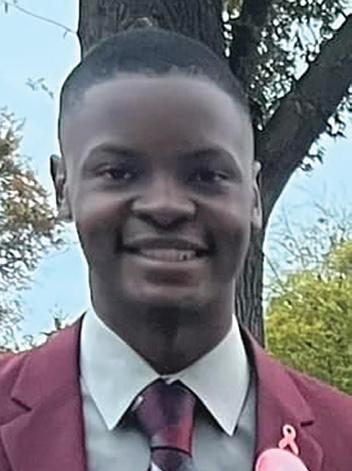
The New Leader and Voice of LA, Karen Bass Sworn in As the 43rd Mayor
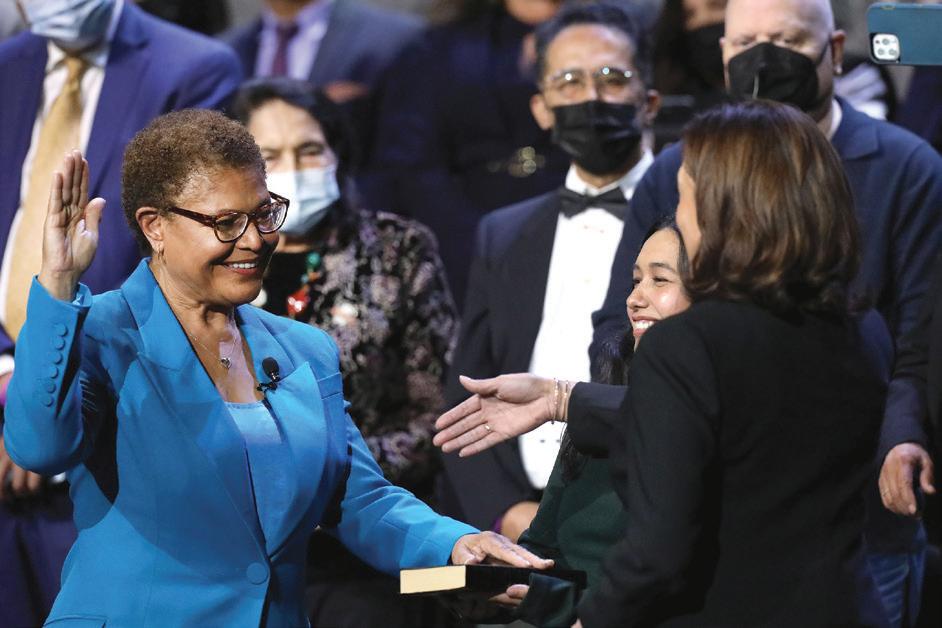
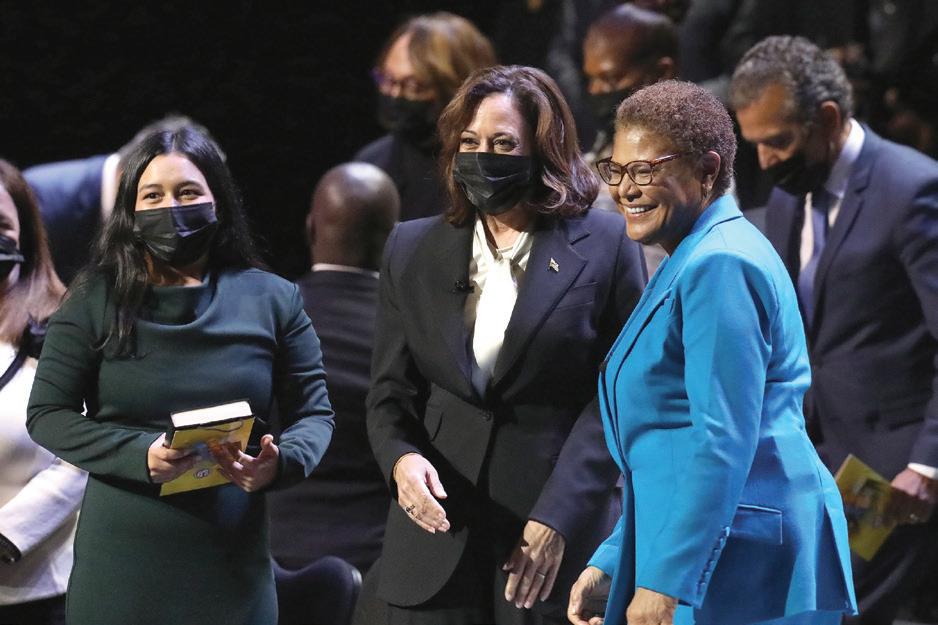 By Philtrina Farquharson Contributing Writer
By Philtrina Farquharson Contributing Writer
This past weekend at the Microsoft Theater, Angelenos witnessed history. Karen Bass went on to assume office and became the first woman and second African-American to be elected mayor of Los Angeles.
Before Bass assumed office as the city’s chief executive, for more than three decades she paved the way for underserved communities advocating for equality, specifically for Blacks and Latinos.
In the 1990s, Bass, who at the time worked as an ER physician’s assistant, brought together a group of activists to create the nonprofit organization Community Coalition. This organization was a response to the cocaine epidemic that was predominately impacting Black communities not only in South L.A. but across the country.
To this day, the nonprofit works to help transform the social and economic conditions of South L.A.“ Karen Bass being elected is a big for the city because her values really speak to the policies needed at this moment. As an organization, we are excited, and we will continue to work with Bass to leverage every opportunity to uplift diverse folks all over the city,” said Patricia Guerra, Director of Organizing, Community Coalition.
Later in her career, Bass then went on to represent Los Angeles in the State Assembly and was elected to serve as speaker. While representing Los Angeles and Culver City in Congress, Bass helped protect small businesses during the pandemic and created policies to drive local jobs.
Fast forward to this weekend, community leaders,
residents, and advocates came together to honor longtime House member Bass as she was officially inaugurated in the city she grew up in and worked so hard to evolve.
The notable event commenced with an invocation representative of the melting pot that is Los Angeles. Encouraging words came from Rev. Norman Johnson, Rabbi Sharon Brous, and Dr. Sadaegh Namazikhah, emphasizing peace, protection, and progression as the mayor and city.
The program included some musical encouragement from the gospel duo Mary Mary. Attendees were also delighted to witness singer-songwriter Chloe Bailey perform and legendary pioneer Stevie Wonder sing soulful tunes in celebration of the new mayor.

To make everything official, Vice President Kamala Harris had the honor of administering the oath of office, formally presenting Bass as mayor. In Bass’ Inaugural Address, she took time to share her vision for leading Los Angeles in a new direction by housing people immediately and making our neighborhoods safer, healthier, and filled with opportunity.
“It feels good to be a Black woman right now. I am vice president of the Black Los Angeles young democrats, and as a Black woman, this historical event shows us what’s possible. We don’t always have to be the staffers; we can be the ones in charge. Also, this is so inspiring as a native Angelino, just like Karen Bass, and her speech reminded us that it’s not just her, but we can all make a change together,” said attendee Shianne Smith.
As heavily mentioned throughout her campaign race, Bass’ first order of business was to recertify homelessness
Brittney Griner Freed
By Stacy M. Brown NNPA Newswire Senior National Correspondent

After 294 days in Russian custody, including the past several weeks in a dreaded and dangerous penal colony, WNBA star Brittney Griner is free.
President Joe Biden and Vice President Kamala Harris met with Griner’s wife at the White House, where they spoke with the basketball player on the telephone.
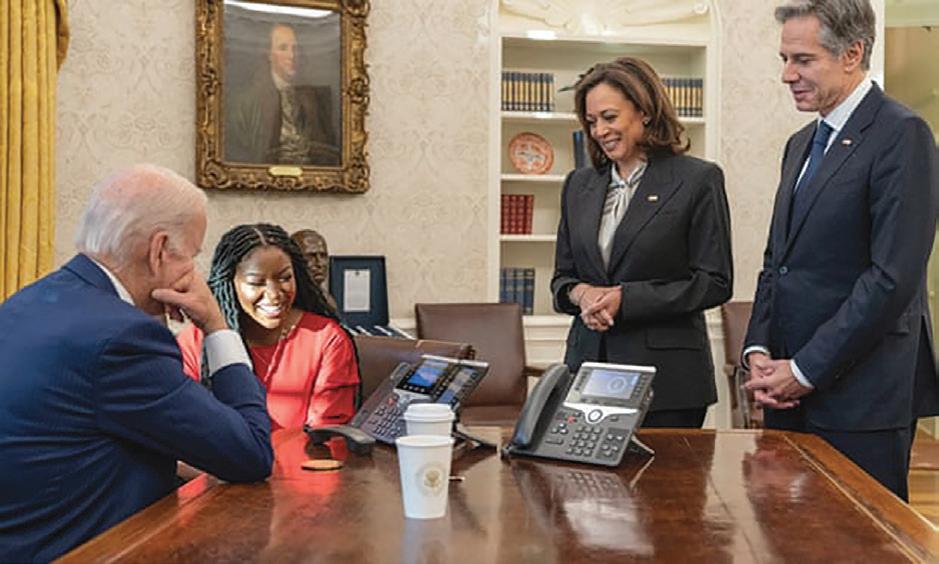
“She’s safe. She’s on a plane. She is on her way home,” Biden declared.
The Biden administration secured Griner’s release after agreeing to a one-for-one prisoner swap that saw the president commute the 25-year sentence of notorious Russian arms dealer Viktor Bout.
The White House said it would continue efforts to bring home retired U.S. military officer Paul Whelan, who remains in Russian custody.
Whelan has been imprisoned in Russia for nearly four years, and, recently, his family said they hadn’t heard from him.
They were told he was transferred to a hospital, but the family doubted that explanation.
The deal to release Griner was consummated a week ago in the United Arab Emirates.
Biden said Griner’s expected home within 24 hours.
“It’s a good morning,” the president exclaimed at a news conference where Vice President Kamala Harris and Griner’s wife, Cherelle, stood close.
“After months of being unjustly detained and held under intolerable circumstances, she’s coming home,” Biden asserted.
The president said his administration “never stopped pushing for her release.”
“It took painstaking and intense negotiations for her release,” Biden stated.
He thanked the UAE for helping to facilitate Griner’s release and noted that’s where her plane landed after finally leaving Russia.
Biden noted that the past few months had been “hell” for Griner and her family.
He said she’s in good spirits and relieved.
“She lost months of her life,” Biden stated.
He said she deserves space, privacy, and time to heal in a not-so-subtle appeal to media members.
Biden added that Griner wrote him in July, not asking for special treatment.
“She said, please don’t forget about me and the other American detainees,” Biden said.
“We have not forgotten about Brittney and Paul Whelan.”
Biden emphasized that the one-for-one swap wasn’t America’s choice.
He said he wished to bring Whelan and any other wrongly detained American home.
“We have not yet secured Paul’s release. But we have not given up, and we will never give up,” Biden insisted.
“We’ll keep negotiating for Paul’s release in good faith. I urge Russia to do the same. My administration has brought home dozens of wrongly detained Americans and many who were detained before I took office,” Biden continued.
“Reunited Americans with their loved ones remain a priority. We will continue to work to bring home every American who endures such injustice.”
Cherelle Griner called Brittney’s plight one of the darkest moments of her life.
“Over the last nine months, you all have been privy to one of the darkest moments of my life. I’m overwhelmed with emotion but sincere gratitude to President Biden and his administration,” Cherelle Griner stated.
“Today, my family is whole. As you are aware, there are so many families who are not whole. BG and I will remain committed to the work of getting every American home, including Paul, who remains in our hearts.”
As expected, civil rights activists, many in the sports world, and politicians applauded Griner’s release.
“This is long overdue,” Rev. Jesse Jackson declared.
“This is a cause for global celebration and could be a step toward peace. Releasing prisoners and prisoner swaps as opposed to more bombing and killing is good news,” Jackson stated.
Texas Democratic Congressman Al Green said he was delighted at the timing of Griner’s release.
“There’s no place like home for the holidays,” Green tweeted.
Tennis legend Billie Jean King tweeted, “Thank you to President Biden and all those who worked so hard to secure her freedom.”
And fellow Democratic Texas Rep. Colin Allred called Griner’s release a relief.
“Brittney Griner is coming home. This is a huge relief for Brittney and her family after months of uncertainty,” Allred said.
“I commend President Biden, Secretary [Antony] Blinken, the State Department, and all those who made this happen. We remain committed to getting every American detained abroad back home.”
The Black Press of America also saluted the Biden administration’s efforts in bringing Griner home.
“The National Newspaper Publishers Association (NNPA) profoundly welcomes the release of Brittney Griner from a Russian prison,” NNPA President and CEO Dr. Benjamin F. Chavis Jr. stated.

The NNPA is the trade association of more than 230 African American-owned newspapers and media companies in the United States.
“Brittney Griner was a political prisoner,” continued Chavis, the leader of the famed Wilmington 10, also political prisoners.
“Thanks to the effective leadership of President Joe Biden, our beloved sister is now free,” Chavis declared.
Bomb Threat Disrupts Patti LaBelle Concert
MILWAUKEE, Wis. (AP) – Patti LaBelle was abruptly rushed off stage just a couple of songs into her Christmas concert in Milwaukee after a bomb threat forced authorities to evacuate the theater.
The Milwaukee Journal Sentinel reports that video from the Riverside Theater on Saturday night shows what appears to be two security officers interrupting the 78-year-old LaBelle as she chats with an audience member. They rush her off stage. Shortly after, someone announced that the nearly full 2,500-seat theater had to be evacuated because of a bomb threat.
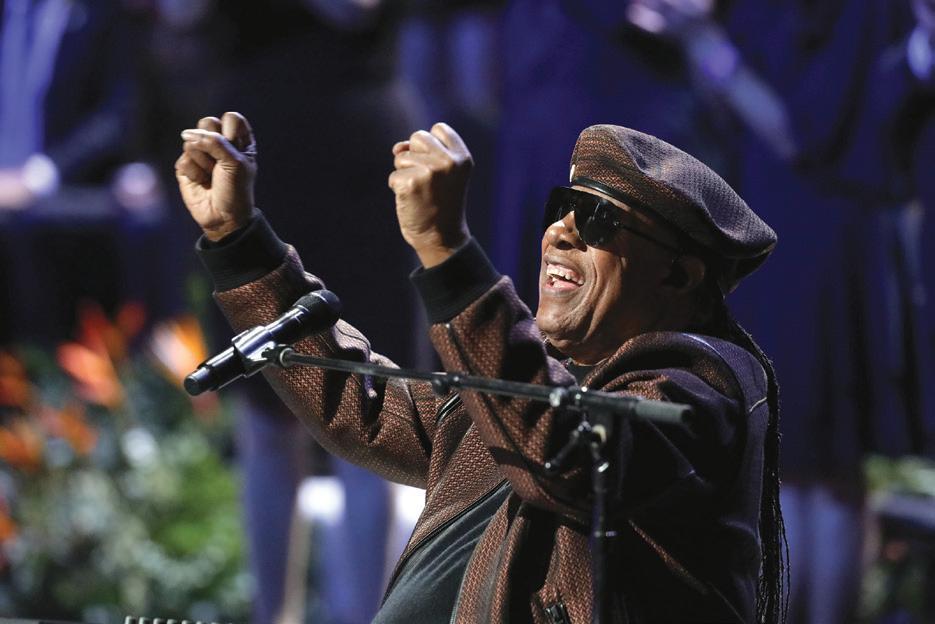
Catherine Brunson, who documented the evacuation on Facebook Live, told the newspaper that the evacuation happened two songs into LaBelle’s concert around 9:24 p.m.
“We came out and police had the block taped off. ... A whole lot of people were pretty upset. ... It’s scary,”Brunson said.
Scott Pierce, who also attended the concert, said everyone exited the theater calmly, but it’s “just sad that someone does this.’’
Milwaukee Police Capt. Warren Allen Jr. said in a statement early Sunday that K9 units searched the theater and no explosive devices were discovered, so there was no threat to the public.
As of Sunday morning, LaBelle hadn’t issued a statement about the evacuation on social media. The operator of the Riverside Theater, Pabst Theater Group, said it would work with LaBelle to reschedule the show in the future.
Embattled LA Councilman Attends City Meeting
LOS ANGELES (AP)
Bonin
“vile
Dozens of people showed up to support de Leon, while others protested his appearance and shouted for him to leave. Police removed two men over concerns a fight could break out.
After a few chaotic minutes, a 45-minute recess was called and de Leon wasn’t in his chair when the session resumed, the Los Angeles Times reported.
It’s the first time de Leon has appeared at a meeting a recording surfaced in October of Martinez, outgoing Councilman Gil Cedillo, de Leon and a labor union leader participating in a closed-door meeting in which racist language was used to mock colleagues while the participants schemed to protect Latino political strength in council districts.
Martinez resigned. Cedillo lost a June election and his last day in office is Monday.
The Associated Press has been unable to reach de Leon for comment. He has apologized but said he has no plans to resign, despite calls to do so from colleagues in the nation’s second-most populous city, and prominent Democrats including Gov. Gavin Newsom and President Joe Biden. He has two more years in office and represents predominantly Latino neighborhoods east of downtown.
Protesters have attended meetings regularly since the scandal broke.
Kansas School’s Students Disciplined for Racist Behavior
By MARGARET STAFFORD Associated PressSeveral students at a Kansas high school have been disciplined for their behavior during a high school basketball game after a coach accused them of making offensive chants toward his team.
Topeka High School Coach Geo Lyons said his team was subjected to “racial slurs, threats and disgusting taunts” by students from Valley Center High School at a game on Dec. 3. He also said Valley Center students taunted his team with a naked Black baby doll.
The principals of the two schools said in a joint statement Friday that a review of game footage and interviews with game attendees resulted in “several’’ students being disciplined but federal law prevents them from saying how many students or the type of discipline.
Amy Pavlacka, a spokeswoman for Valley Center, said the schools’ joint investigation did not find any racist taunts from the student section.
“Any racial words that were used were isolated and made by individuals,’’ she said in an email.
The principals’ statement also said some information circulated after the game was factual but “there have been numerous reports that are exaggerated and/or inaccurate.’’
“This has led to responses from both communities that have become inflamed and disappointing,’’ the statement said. “This is not appropriate, does not provide for a productive environment where true change can occur, and is currently being addressed by the schools and communities appropriately.’’
The controversy received widespread publicity on Tuesday. The next day, Valley Center closed its schools, saying the district had received a deluge of online threats. Classes resumed on Thursday with an increased law enforcement presence.
Valley Center officials apologized after the game for the behavior of some in its student section and Friday’s statement repeated that apology.
“Valley Center and Topeka High Schools are committed to work together to repair the harm that has been done, and to take actions both separately and together that will lead to positive and productive change with regards to addressing sportsmanship and racism,’’ the statement said.
by declaring a state of emergency, and she did just that on Monday morning. One of the most significant issues in Los Angeles, as most know, is the unhoused residents that seem to have ravished the communities we know. Bass’s declaration will recognize the severity of this crisis and break new ground in getting people inside, hoping to change Los Angeles for the better. “This is an incredible moment, I am looking forward to the future with Karen Bass as leader,” said attendee Luckie Alexander.World & Nation
Hanukah:
O. Smith California Black MediaHanukkah, one of the most visible holidays of the Jewish faith, is right around the corner.
As much as the public may be aware of Hanukah, many Californians don’t understand the basics of this holiday, which will be celebrated by millions around the world for eight days beginning the evening of Sunday, Dec. 18 and ending the evening of Monday, Dec. 26.
Origins of Hanukah
Hanukkah began with a war and a miracle, according to Rabbi Isaiah Rothstein, a rabbinic scholar and Black Jewish leader in the Jewish Equity, Diversity & Inclusion program of the Jewish Federation of North America, or JEDI.
It marks the freeing of Judea by the Jewish freedom fighters called the Maccabee over the Assyrian-Greek occupiers more than 2,300 years ago. After recapturing the Holy Temple in Jerusalem which had been desecrated by the occupiers, the freed om fighters searched for oil to light the Temple menorah as part of the rededication of the temple. They found a single day’s worth of fuel, but it miraculously burned for eight days before being resupplied.
“So, there’s a combination of things in the holiday, which is really celebrating that the oil lasted longer, and also the War of the few against the many,” said Rothstein “And then, the over the last 15 or 20 years, many other themes have come into being, like light over darkness.”
By many, the holiday is referred to as the “festival of lights” and is celebrated on the 25th of Kislev on the Hebrew calendar. Because the Hebrew calendar follows the lunar cycle, the dates of Jewish holidays change from year to year according to the Gregorian calendar. As a result, the beginning of Hanukkah can range from late November to late December.
Although often compared to Christmas, Hanukkah is
not one of the High Jewish Holidays, which are considered more core to the belief system. Hanukkah is closer to Thanksgiving in tone. It celebrates the rededication of oneself to God, the faith and family.
The Celebration
The most visual part of the holiday is the lighting of the Hanukkah menorah, or “hanukkiah” in Hebrew. It holds eight candles, one for each day of the festival, and a helper candle or “shamash,” in the center which is used to light the others. It can be made of a wide range of materials and has become a symbol of the faith.
Many communities have large communal hanukkiah which are lit as part of an inclusive celebration. Washington, D.C. has a National Menorah and lighting festival, while New York claims the world’s largest Hanukkah menorah.
The tone of Hanukkah is not the same as Christmas which has traditionally become a holiday heavily focused on youth. Christmas gifts are ubiquitous in the United States and the eight days of Chanukkah have also begun to include gifts.
In other parts of the world, where Jews were persecuted a quieter less public observance took root. Many in Europe escaping Nazi persecution or Russian pogroms were raised to be cautious in their celebrations according to Rothstein.
Often the very act of displaying or lighting a hanukkiah could be dangerous. It led to the lighting of the menorah to be associated with rebellion against oppression.
Some of the concepts of the menorah and lighting its candles have even influenced other holidays like Kwanzaa, some religious and cultural observers say. For Hanukkah, each candle represents a day of the holiday; for Kwanzaa, each one stands for a life principle.
A custom associated with Hanukkah is playing games with the dreidel, a small spinning top. According to Rothstein the toy was used to fool the ruling authority and
hide the study of the Torah.
Another Hanukkah custom is to give money (called Hanukkah gelt) to children. Hanukkah-themed chocolate coins wrapped in gold or silver foil are used as substitute to real money gifts.
Food is a big part of the holiday. Traditional Hanukkah recipes include foods fried in oil, to commemorate the original miracle of the oil. Fried donuts and potato pancakes or latkes are a favorite. Dairy products are also popular during Hanukkah.
The People
There are about 7.6 million persons who identify as Jewish across the country, with California containing 15%, the second highest behind New York at 21% according to the American Jewish Population Project.
There are a number of national organizations that help the public understand Judaism, including the celebration of Hanukkah.
The Jewish Federation of North America provides a range of services to the community and brings together over 300 different organizations according to Niv Elis, the communications director at the Jewish Federation of North America.

“So, the Jewish Federation we’re a system that encourages Jewish communities to flourish,” said Elis. “That’s our main thing is that we think of ourselves sometimes as the backbone of the Jewish community. We’re not the entirety of it, but we support all the different parts.”
The Jewish diaspora is widespread and crosses many borders, including race. In the United States some Black members of the faith can find it to be an isolating experience.
Robin Washington’s article for NPR about being the singular Black Jewish person left in Duluth, Minnesota is just one example. He points out that there are a lot of Black Jews.
There are at least 200,000 Black American Jews. There are biracial Jews with a Jewish parent like him. Some converted to Judaism, and some belong to Black Hebrew congregations that formed at the turn of the last century.
Rothstein and his organization are working to connect to African American members and address those feeling disconnected.
“We’re building community, like every single week,” said Rothstein. “We connect with different Black Jews and Jews of color from across the community, across the country.”
This California Black Media report was supported in whole or in part by funding provided by the State of California, administered by the California State Library.
Sacramento: Black Caucus Welcomes
On Dec. 5,
Right after taking the oath of office to represent California’s 60th Assembly District, Jackson appeared to be in awe when he walked into his new role -- and into his brand new, empty state office two blocks away to a desk, chair, an empty bookshelf, an American flag, and a California State Flag.
“Now it’s time to go work,” he said, smiling, to his staff and visiting constituents who attended the swearingin ceremony. “I came here (to Sacramento) to talk because my business is to talk about issues and how to fix them.”
News Observer
Adjudicated a Newspaper of General Circulation on July 2, 1991, Los Angeles Superior Court Decree, Case No. BS007262, Government Code 6023.
Bulk Mailing Permit 724 Bakersfield, CA 93385
Published every Thursday by The Observer Group Newspapers of Southern California, Inc.
Member: National Newspaper Publishers Assc. Associated Press, Better Business Bureau, GLAAACC
President: Ellen Coley CEO: Jon Coley Publisher/ Editor: James Luckey Jr. Operations Manager: James Luckey
Credo - The Black Press believes that America can best lead the world away from racial and national antagonisms when it accounts to every person, regardless of race, color, or creed full human and legal rights. Hating no person, fearing no person, the Black Press strives to help every person in the firm belief that all are hurt as long as any one is held back.
The Observer Group Newspapers reserves the right to publish views and opinions that may not necessarily reflect those of the staff and management are soleley the product of the responsible individuals who submit commentaries published in these newspapers. Letters, articles and comments appearing in the Observer Newspapers reflect the opinions of the contributor and do not constitute the opinion or endorsement by The Observer Newspapers or its staff. The Observer Group Newspapers assumes no responsibility for photographs, articles, letters, press releases and unsolicited materials. Decisions as to the editiing and publishing of materials are at the discretion of the Publisher and Editors. All rights are reserved on materials accepted for publication unless otherwise specified.
The Observer Group Newspapers of Southern California, Inc.: Los Angeles News Observer, Bakersfield News Observer, The Valley’s News Observer
The Valley’s News Observer 6060 Center Drive Floor 10, Los Angeles, CA 90045 Mailing Address: PO Box 2341, Bakersfield, Ca. 93303 Phone (661) 324-9466 FAX (661) 324-9472
General Info: observernews@gmail.com
Advertising: observeradvertising@gmail.com Online: www.ognsc.com
Jackson’s
The first Black openly LGBTQ+ person elected to the State Assembly, Jackson is the founder and Chief Executive Officer of SBX Youth and Family Services. He is former member of the Riverside County Board of Education and a graduate of California Baptist University where he received Master and Doctor of Social Work degrees.
Jackson is one of the new faces in the last 16 months to join the California Legislative Black Caucus (CLBC). Lola Smallwood-Cuevas (D-Los Angeles), Tina McKinnor (D-Inglewood), Mia Bonta (D-Alameda), and Lori Wilson (D-Suisun City) are the newest members of CLBC’s coalition of 12 Black lawmakers.
Smallwood-Cuevas represents the 28th Senate District. She is the only Black woman in the Senate. A graduate of California State University at Hayward (now called CSU-East Bay), she is an educator, labor organizer, community advocate, researcher, and journalist.
Smallwood-Cuevas replaces Sydney Kamlager who was elected to the U.S. Congress seat held by Karen Bass. Last month, Bass was elected the first Black woman to be mayor of Los Angeles.
Smallwood-Cuevas’ district includes the communities of Ladera Heights, View Park, Baldwin Hills, Crenshaw, Downtown Los Angeles, Leimert Park, Mar Vista, Mid City, South Los Angeles, University Park, West Adams, and Culver City.
“I am the 63rd woman ever to be sworn into this illustrious body and one of a handful of dynamic Black women leaders to grace this chamber with their excellence,” Smallwood-Cuevas posted on her Facebook page last week.
In a special election to replace Autumn Burke who resigned in January, McKinnor (D-Inglewood) was elected to represent the 62nd Assembly District, which includes Gardena, Hawthorne, Inglewood, Lawndale, Lenox, Los Angeles, Marina del Rey, Venice, West Athens, Westchester and Westmont in Los Angeles County.
In November, due to redistricting McKinnor was elected to represent the 61st Assembly District which contains many of the same communities as the previous 62nd District.
“Today (Dec. 5) I was sworn in for my first term in the California State Assembly,” McKinnor posted on her Facebook page. “I am proud to represent Assembly District
61.
In August, Bonta won a special election to represent the 18th Assembly District. She replaced her husband Rob Bonta, who was appointed California’s Attorney General last year by Gov. Gavin Newsom.
Bonta’s district covers the East Bay area of Northern California. It includes a large portion of the City of Oakland and the cities of San Leandro and Alameda.
Bonta, who self-identifies as a Black Latina, holds a Bachelor of Arts in psychology from Yale University, a Master of Education from Harvard Graduate School of Education, and a Juris Doctorate from Yale Law School.
Assemblymember Lori Wilson represents California’s 11th Assembly district. She assumed office on April 6 after winning the seat vacated by former Assemblymember Jim Frazier.
As mayor of Suisun City, Wilson was the first Black woman mayor to serve in Solano County. She is a graduate of California State University, Sacramento with a Bachelor of Science degree in Business Administration with a concentration in Accountancy
The CLBC elected Wilson and Sen. Steven Bradford (D-Gardena) to serve as its Chair and Vice-Chair for the 2023-2024 legislative session.
Assemblymember Akilah Weber (D-San Diego) was elected secretary and Assemblymember Isaac G. Bryan (D-Los Angeles) was elected treasurer. The newly elected officers’ two-year terms began this month.
“I look forward to working with my colleagues to uplift over two million Black residents living in California,” Wilson said in an August written statement.
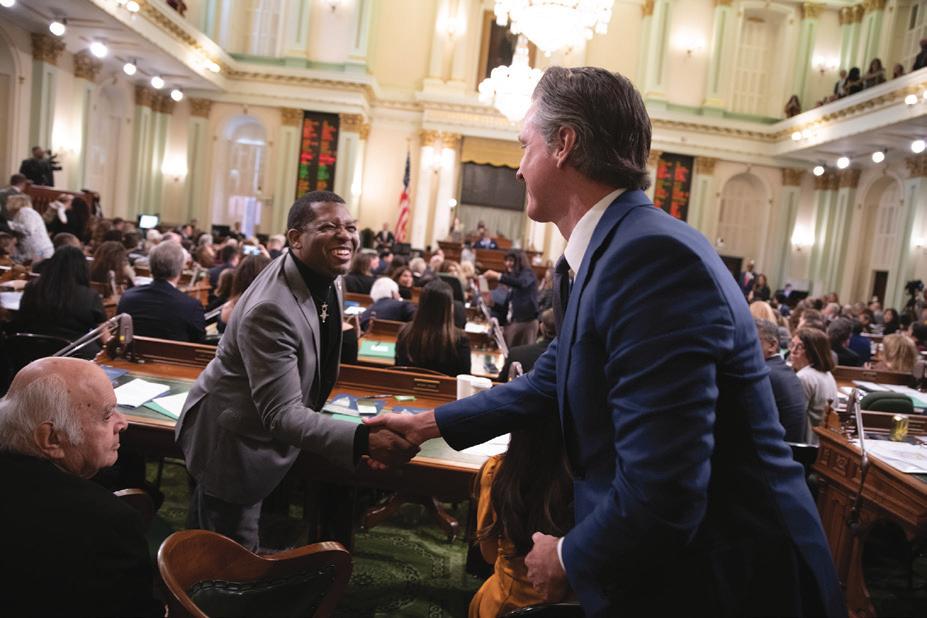
Two CLBC members will not be returning. Outgoing Assemblymember Jim Cooper (D-Elk Grove) was elected as Sheriff of Sacramento County in June, and Kamlager will begin serving in the U.S. House of Representatives in January 2023.
CLBC members make up 10% of the Assembly and 5% of the Senate. California’s Black population is about 6.5% according to the US Census.
Veteran Assemblymembers Chris Holden (D-Pasadena), Reggie Jones Sawyer (D-Los Angeles), Mike Gipson (D-Carson), and Kevin McCarty (D-Sacramento)
The current and former members of CLBC believe that a “caucus representing concerns of the African American community” would furnish political influence and visibility far beyond their numbers, according to their mission statement.
CBLC Vice-Chair Bradford was recently awarded the National Black Caucus of State Legislators (NBCSL) Lifetime Achievement Award. NBCSL is the nation’s premier organization representing and serving the interests of African American State legislators.
“I am humbled beyond words,” Bradford said as he received the award. “I know that I’m only able to do the work I’m doing because of the people that have come before me. I stand on their shoulders and hope that one day others will reach even greater heights. I graciously accept this award and commit to continuing my work to promote equity, equal justice, and opportunity in every region of California.”
Senior administration officials said the Summit will
the United States’ enduring commitment to Africa and will underscore the importance of U.S.-Africa relations and increased cooperation on shared global priorities.
Africa will shape the future — not just the future of the African people, but of the world, an administration official stated.
White House officials further stated that Africa will “make the difference in tackling the most urgent challenges and seizing the opportunities we all face.”
“I look forward to working with African governments, civil society, diaspora communities across the United States, and the private sector to continue strengthening our shared vision for the future of U.S.-Africa relations,” Biden said in statement.
Fifty African delegations from 49 countries are expected to gather and engage in discussions that include governance, investment, development, climate change, and health.
Brukina Faso, Mali, Guinea, and Sudan were not invited because the African Union suspended those nations and the U.S.
Eritrea also won’t have representation because America
doesn’t have diplomatic relations with that nation.
In a press briefing, a senior administration official said America plans to announce, “major deliverables and initiatives.”
“This is also about defining a global agenda together where there are opportunities where Africans should – will, must – sit at the table and help us work through some of the most difficult challenges in this consequential decade,” the official stated.
The summit will explore how America can work with African governments on security challenges, and a senior official said the Pentagon already is taking a three-pronged approach – blending defense, development, and diplomacy – to address African security challenges.

Discussions also are expected to center on finances, morality, and other hot-button topics like human rights.
“While we do not wish to make our African partners choose sides, the U.S. strives to be the partner of choice by offering relationships based on mutual respect and values,” an official from the U.S. Department of Defense stated.
“By providing higher quality products and services and by working together with our partners on issues that are important to them. We are confident that our relationship will bring about long-term stability and prosperity.”
Senior administration officials said Biden’s foreign policy is “rooted in values – values like promoting human rights. Human rights will always be on the agenda, and the president will not shy away from raising these issues with any foreign leader anywhere in the world.”
‘Tar,’ ‘Everything Everywhere’ Tie for LA Critics’ Top Award

LOS ANGELES (AP) – Todd Field's symphonic backstage drama “Tar” and the existential comedy “Everything Everywhere All at Once” tied for top honors with the Los Angeles Film Critics Association in awards announced Sunday.
The critics group opted to split its best film award between the two acclaimed films. “Tar,” which was also chosen as best film by the New York Film Critics Circle,

cleaned up in other categories as well. Field won for both directing and screenplay, and Cate Blanchett, who stars as an internationally renowned conductor, won best lead performance. The critics, who don't separate award by gender, also gave best lead performance to Bill Nighy for the “Ikiru” remake “Living.”
“Everything Everywhere All at Once,” the madcap metaverse movie from Daniel Kwan and Daniel Scheinert,
also
“EO” for best non-English
“All the
and the
film; and
Other
“Pinocchio”
‘Banshees,’ Whitney Houston, ‘High on Life’
By The Associated PressMOVIES
– In “The Banshees of Inisherin,”director
reteams
and
life in a new documentary called “The Master of Glass: The Art of Dale Chihuly,”premiered Sunday.
– David Letterman traveled to Kyiv to sit down with Ukraine’s President Volodymyr Zelenskyy for a special one-off episode of Netflix’s “My Next Guest,”debuting Monday. “I’ve never done anything quite like this,”says Letterman in a clip as he descends on an escalator 300 feet below ground. The conversation was recorded in October on a subway platform-turned-stage, complete with a small live audience.
the stars of the
debut, 2008’s “In Bruges.”The results are just as good. On a small island off the west coast of Ireland in 1923, they play longtime pals whose friendship abruptly and a little mysteriously comes to an end. Both Farrell and Gleeson have already won awards for their performances. It’s still playing in theaters but on Tuesday it reaches video on demand. In her review, AP Film Writer Lindsey Bahr called it “an aching reverie about friendship and fulfillment that is one of the very best films of the year.’’
– Nikyatu Jusu makes one of the more arresting directorial debuts of the year in Amazon Studios’ “Nanny.”The grand jury prize-winner of the Sundance Film Festival, “Nanny”stars Anna Diop as Aisha, a welleducated Senegalese caregiver for a white New York family. (Michelle Monaghan co-stars.) Aisha’s own daughter remains in Africa. She sends home money while her wealthy employers casually take advantage of her kindness. Jusu uses the dark atmosphere of a horror film to convey the dread and displacement of the immigrant experience. It streams Friday, Dec. 16, on Amazon Prime Video.
– The masterful Korean director Park Chan-wook is best known for genre extremes like “Oldboy”and “The Handmaiden.”In his prize-winning latest, “Decision to Leave,”he conjures a more subtly beguiling tale, a slinky fusion of police procedural and romance. The film, which began streaming on MUBI on Dec. 9, stars Park Hae-il as a Busan detective who becomes infatuated by the suspect (Tang Wei) of a murder investigation. In her review, Bahr said the film lulls you “into a misty, dreamlike delirium until you’re not even certain of what’s right in front of your face.’’
– AP Film Writer Jake Coyle– A week before the movie release of the Whitney Houston biopic “I Wanna Dance With Somebody,”comes an album with 35 tracks that includes a never-beforereleased a cappella live recording of “Don’t Cry For Me.”Houston recorded it in 1994 while on The Bodyguard World Tour, flying back to perform it at an AIDS benefit concert. The song and an original re-imagined version of it by producer Sam Feldt is also included on “I Wanna Dance With Somebody”out on Friday, Dec. 16. The movie of the same name hits movie theaters Dec. 23.

– Brazilian global pop superstar Anitta will perform
TELEVISION
– If you’re not familiar with Dale Chihuly’s name, it’s possible you’ve seen his breathtaking, colorful blown glass art. Now 81, his work can be found in museums worldwide (and even on the ceiling of The Bellagio casino in Las Vegas.) Chihuly’s story is compelling as well, as he’s battled mental health issues and experienced personal tragedy. An avid collector of random things including Pez dispensers and midcentury refrigerators, The Smithsonian Channel delves into the artist’s personal and professional
– Rising comedian Atsuko Okatsuka debuted her first HBO comedy special called “The Intruder”on Saturday. Okatsuka is wrapping up an exciting 2022 where she headlined her first national solo tour and made her latenight talk show debut on “The Late Late Show”with James Corden. She also started the viral (hash)dropchallenge with her grandmother on TikTok (where one slowly squats to Beyonce’s song “Yonce”while staring into camera) which has received more than 10 million views.
– PBS will broadcast the second annual Earthshot Prize awards ceremony founded by William, The Prince of Wales, recognizing individuals for their environmental work. Earthshot offers 1 million pounds ($1.2 million) in prize money to the winners of five separate categories: nature protection, clean air, ocean revival, waste elimination and climate change. The special was filmed recently in Boston with live appearances by Annie Lennox, Ellie Goulding, and Chloe x Halle. Billie Eilish performed remotely. Presenters included Oscar winner Rami Malek, comedian Catherine O’Hara and actor Daniel Dae Kim. The Earthshot Prize airs Wednesday on PBS.
– Alicia Rancilio
VIDEO GAMES
– Some aliens want to conquer Earth. Some want to make friends. And some just want to get “High on Life”_ because it turns out human flesh can be quite intoxicating. That’s the premise of the new shoot-’em-up from Squanch Games, the studio founded by “Rick and Morty”co-creator Justin Roiland. As you’d expect, there’s plenty of irreverent humor, mostly delivered by the very chatty weapons you need to repel the invasion. It’s also pretty gross: There’s slime just about everywhere, and enemies explode with a squishiness that’s either delightful or appalling. “High on Life”makes a splash Tuesday, Dec. 13, on Xbox X/S, Xbox One and PC.
– Lou Kesten By CLAIRE SAVAGE Associated Press/Report forMack
Although Mack was convicted in Indonesia, U.S. prosecutors filed their own case, accusing her of conspiring with a former boyfriend before they traveled to the islands
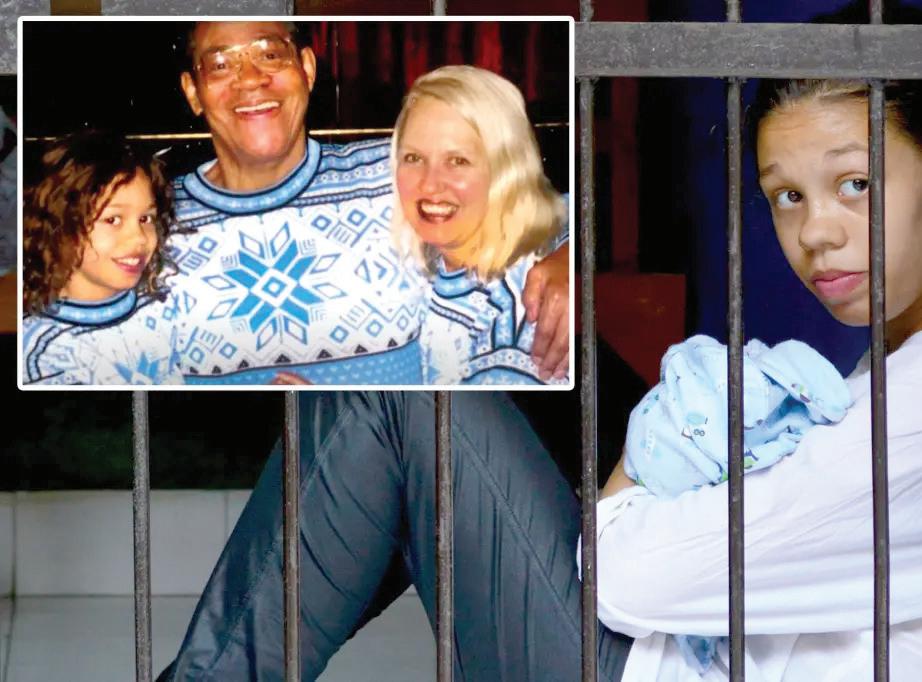
Small Arkansas City Elects Youngest Black Mayor in U.S. History
By Stacy M. Brown NNPA Newswire Senior National CorrespondentAt 18, Jaylen Smith recognizes the need for civic involvement.
He believes his small city of Earle, Arkansas, would benefit from improved public safety measures and less blight.
Smith will now have the chance to implement those improvements after becoming the youngest Black mayor in America.
He earned that distinction by defeating his friend, Nemi Matthews Sr., who works as the city’s street superintendent.
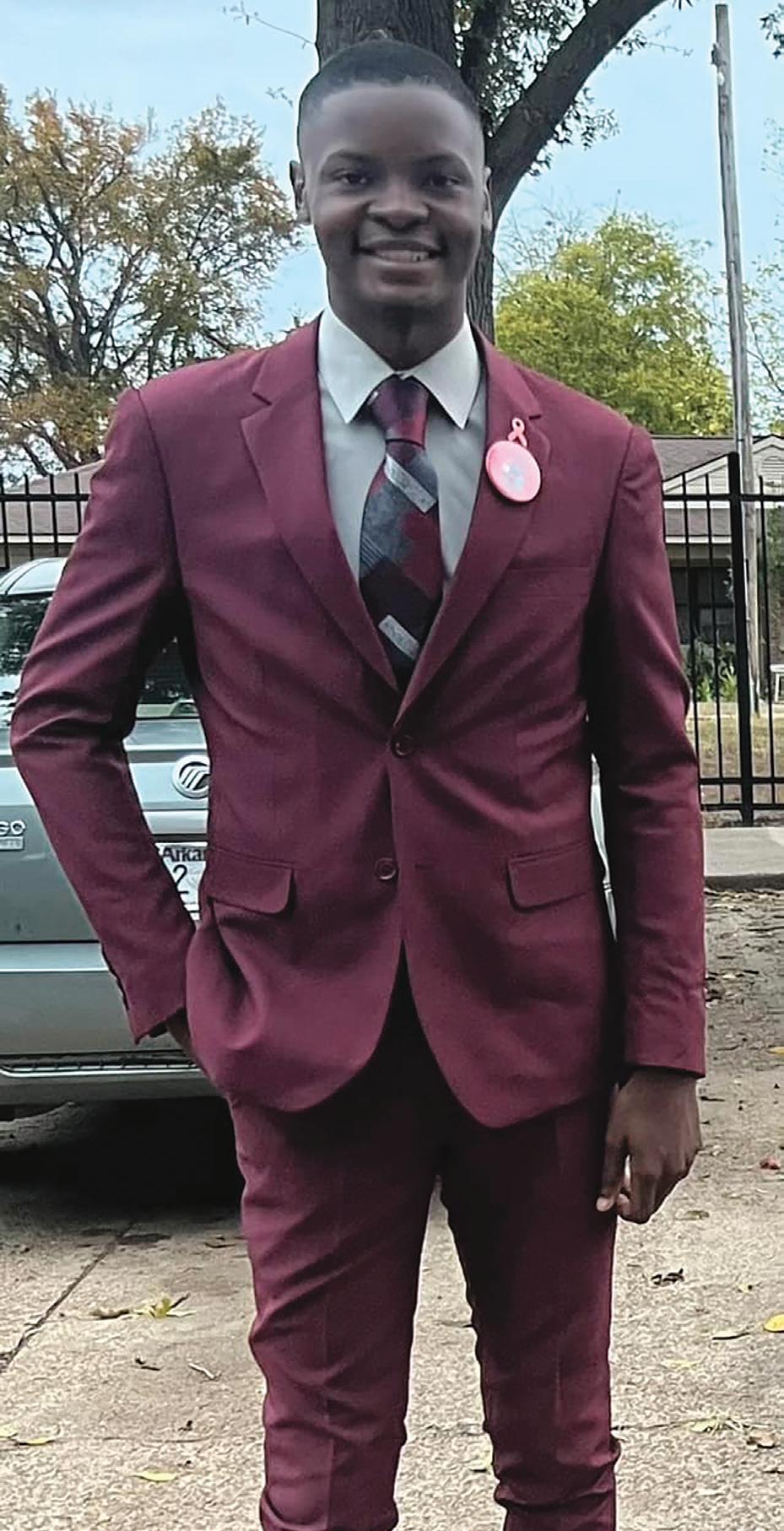
“I’m your newly elected mayor, and it’s time to build,” Smith declared following his Dec. 6 election victory.
According to the 2020 U.S. Census, Earle is a small city of 2,164 residents just 28 miles west of Memphis,
Tennessee.
According to the Encyclopedia of Arkansas, Earle was named after English-born Josiah Francis Earle, who had land holdings in the area.
Earle had served in the Mexican War and with the Arkansas militia and regular Confederate cavalry during the Civil War.
Following the war, Earle became active in the Ku Klux Klan, and on one occasion in Memphis, he was rescued by Klansmen before he could be executed by hanging.
Earle died in 1884 and left his considerable holdings to his wife and four children. When the railroad through Earle was built in 1888, Earle’s widow constructed a small depot to encourage trains to stop there; she named it for her late husband.
The most recent train depot was built in 1922 and
was abandoned when passenger and freight stops were discontinued in the 1960s; the old depot now operates as the Crittenden County Museum.
Today, the city has an unemployment rate (5.8%) below the national average and enjoys recent job growth.
The cost of living in the predominantly Democratic city is nearly 27% lower than the national average, and the median home cost is $68,400. Additionally, Earle Public Schools spend $13,778 per student, about $1,300 more than the average school expenditure in the United States.
“It’s time to build a better chapter of Earle, Arkansas,” Smith declared. He said he intends to improve public safety, tear down abandoned houses, and open a new grocery store.
“You’re never too young to want to make a difference in your community,” Smith asserted.
Big U.S. Cities Fail to Provide Data for New FBI Hate Crimes Report
By Stacy M. Brown NNPA Newswire Senior National Correspondent
Critics immediately threw cold water on a new FBI 2021 Hate Crime Statistics Act Report released by U.S. Department of Justice officials on Monday, Dec. 12.
Margaret Huang, the president, and CEO of the Southern Poverty Law Center, said while underreporting of hate crimes to the FBI remains an ongoing problem, the failure of state and local jurisdictions to report data makes the new report worse.
Over one-third of the nation’s 18,000 federal, state, local, and tribal law enforcement agencies failed to report data to the FBI.
In 2020, the number of agencies reporting was 3,300 fewer than in 2021.
The latest reporting year counted as the first in which the FBI required every agency to report all crimes, including hate crimes, through its National Incident-Based Reporting System (NIBRS).
Huang said that even though the FBI provided technical assistance and funding for its new requirement, many jurisdictions were unable or unwilling to report through the new system.
She said the result is dramatically incomplete.
It needs more data from major population centers, including New York City, Los Angeles, Chicago, Phoenix, and the entire states of Florida and California.
“While the FBI’s annual Hate Crime report has been the nation’s best available snapshot of hate violence in America, this year’s data is woefully incomplete, inaccurate, and simply cannot be trusted – certainly not to compare to previous years. Victims and communities affected by hate crimes deserve better,” Huang asserted.
“The failure of thousands of police agencies across the country to participate in this report is devastating for the individuals and communities harmed by these crimes and our ability to understand and prevent them,” she said.
Huang added that accurate, comprehensive national data is integral to addressing the root causes, designing prevention strategies, and providing support to victims and communities.
“There may be a temptation to draw conclusions from this woefully incomplete and flawed report about the rate of reported hate crimes, especially those targeting Black and AAPI communities, Sikhs, and LGBTQ people,” Huang continued.
“But comparing this piecemeal national data to previous years would be wrong. This first NIBRS reporting year data is simply too unreliable.
“We cannot outlaw hate, but we can do more to
support victims of hate violence by ensuring they are heard and to confront the problem by measuring it accurately.
“As the transition to NIBRS continues, SPLC and our coalition partners will be urging the Justice Department and FBI to focus attention and resources on communitybased prevention and response strategies.
“And, until legislation requiring hate crime reporting can be enacted, federal funds to law enforcement agencies should be conditioned on credible HCSA reporting, or meaningful community hate crime prevention and awareness initiatives. We can and must do better.”
The latest report found more than 7,000 hate crimes committed in 2021.
The FBI defines a hate crime as a “committed criminal offense which is motivated, in whole or in part, by the offender’s bias(es) against a race, religion, disability, sexual orientation, ethnicity, gender, or gender identity.”
Ted Deutch, CEO of the American Jewish Committee, called the report “woefully inadequate.”
He said 35 major U.S. cities failed to report hate crimes in 2021, while the country’s two largest cities, New York, and Los Angeles, did not provide data.
The third-largest, Chicago, reported zero, according to the FBI’s report.
According to the report, more than 7,000 single-bias incidents were recorded involving more than 8,700 victims.
Sixty-five percent of victims were targeted because of the offender’s race, ethnicity, or ancestry bias; 16% occurred because of prejudice against the individual’s sexual orientation; 13% was religious bias; 4% gender identity; 2% disability; 1% gender bias.
The report further found 188 multiple-bias hate crime incidents involving 271 victims, and more than 5,700 hate offenses were classified as against persons, with 44% intimation, 36% simple assault, and 18% aggravated assault.
Officials classified nine murders and 13 rapes as hate crimes.
The statistics revealed that nearly 56% of the offenders were white, and about 21% were African American.
Since January 2021, the United States Department of Justice said it had taken several actions in response to a rise in hate crimes and incidents.
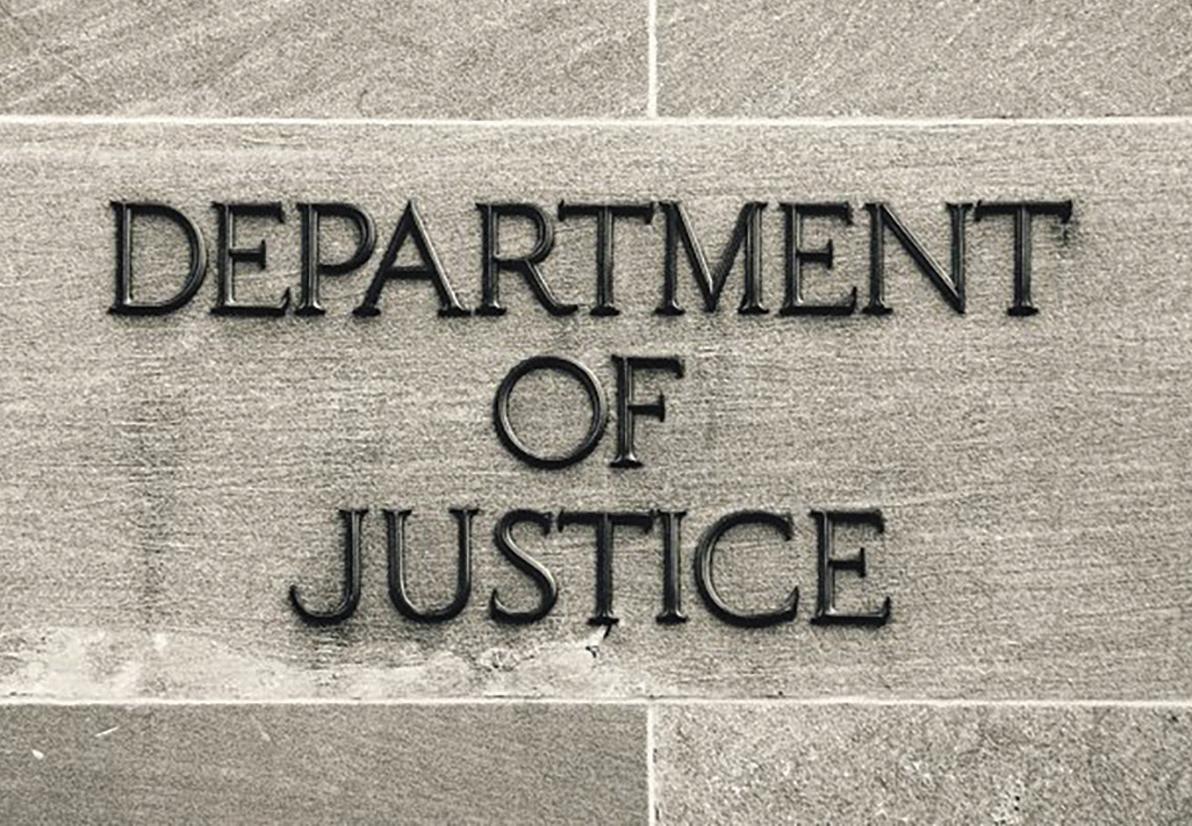
Some of these actions include aggressively investigating and prosecuting hate crimes as the department charged more than 60 defendants in over 55 different cases and secured more than 55 convictions.
DOJ also designated a Deputy Associate Attorney General as the first-ever Anti-Hate Crimes Resources Coordinator, and announced that all 94 U.S. Attorneys’
Offices would host a United Against Hate program over the next year to help improve the reporting of hate crimes by teaching community members how to identify, report and help prevent hate crimes, and to provide an opportunity for trust-building between law enforcement and communities.
“The Justice Department is committed to prioritizing prevention, investigation, and prosecution of hate crimes,” Associate U.S. Attorney General Vanita Gupta stated.
“The FBI’s 2021 Hate Crimes Statistics are a reminder of the need to continue our vigorous efforts to address this pervasive issue in America.”
Gupta added that the Justice Department continues to work with the nation’s law enforcement agencies to increase the reporting of hate crime statistics to the FBI to ensure they have the data to help accurately identify and prevent hate crimes.
“No one in this country should be forced to live their life in fear of being attacked because of what they look like, whom they love, or where they worship,” Gupta insisted.
“The department will continue using all the tools and resources at our disposal to stand up to bias-motivated violence in our communities.”
More States to Consider Extending Postpartum Medicaid Coverage
By Matt Volz KHN.orgLawmakers in several conservative-led states — including Montana, Wyoming, Missouri, and Mississippi — are expected to consider proposals to provide a year of continuous health coverage to new mothers enrolled in Medicaid.

Medicaid beneficiaries nationwide are guaranteed continuous postpartum coverage during the ongoing covid-19 public health emergency. But momentum has been building for states to extend the default 60-day required coverage period ahead of the emergency’s eventual end. Approximately 42% of births nationwide are covered under Medicaid, the federal-state health insurance program for low-income people, and extending postpartum coverage aims to reduce the risk of pregnancy-related deaths and illnesses by ensuring that new mothers’ medical care isn’t interrupted.
The push comes as a provision in the American Rescue Plan Act makes extending postpartum Medicaid coverage easier because states no longer need to apply for a waiver. A renewed focus on maternal health amid high U.S. maternal mortality rates also is driving the proposals, as is the expectation that more women will need postpartum care as state abortion bans proliferate in the wake of the U.S. Supreme Court’s decision to eliminate federal protections.
Thirty-five states and Washington, D.C., have already extended, or plan to extend, postpartum eligibility in their Medicaid programs. That number includes Texas and Wisconsin, which did not implement the ARPA provision but have proposed limited extensions of six months and 90 days, respectively.
The 15 states that limit postpartum Medicaid eligibility to 60 days are predominantly a swath of Republican-led states that stretch from the Mountain West to the South. But that could change when legislative sessions start in the new year.
In Montana, Republican Gov. Greg Gianforte and Department of Public Health and Human Services
Director Charlie Brereton included 12-month postpartum eligibility in the governor’s proposed state budget. It would cost $9.2 million in federal and state funding over the next two years, according to the proposal, with the federal government covering nearly 70%.
A 2021 U.S. Department of Health and Human Services report estimated about 2,000 women in Montana would benefit from the change. State health department spokesperson Jon Ebelt said state officials’ estimate is half that number. The reason for the disparity was not immediately clear.
Brereton considers the “extension of coverage for new mothers to be a pro-life, pro-family reform,” Ebelt said.
To become law, the proposal must be approved by state lawmakers once the legislative session begins in January. It has already received enthusiastic support from the senior Democrat on the committee that oversees the health department’s budget. “Continuous eligibility for women after they have a baby is really important,” said state Rep. Mary Caferro during the Children’s Legislative Forum in Helena on Nov. 30.
The top Republican on the committee, state Rep.elect Bob Keenan, said he hasn’t dug in on the governor’s budget proposal but added that he plans to survey his fellow lawmakers and health care providers on the postpartum extension. “I wouldn’t dare venture a guess as to its acceptance,” he said.
Nationwide, more than 1 in 5 mothers whose pregnancies were covered by Medicaid lose their insurance within six months of giving birth, and 1 in 3 pregnancyrelated deaths happen between a week and a year after a birth occurs, according to federal health officials.
The U.S. had the highest overall maternal mortality rate, by far, among wealthy nations in 2020, at 23.8 deaths per 100,000 births, according to a report by the Commonwealth Fund, a foundation that supports research focused on health care issues. The rate for Black women in the U.S. is even higher, 55.3 deaths.
“Many maternal deaths result from missed or delayed
opportunities for treatment,” the report said.
The maternal mortality rate in Montana is not publicly available because the Centers for Disease Control and Prevention suppressed the state data in 2020 “due to reliability and confidentiality restrictions.” Ebelt, the state health department spokesperson, could not provide a rate before this article’s publication.
Annie Glover, a senior research scientist for the University of Montana’s Rural Institute for Inclusive Communities, said the governor’s proposal to extend postpartum Medicaid coverage could make a significant difference in improving overall maternal health in Montana. The university was awarded a federal grant this year for such efforts, particularly to lower the mortality rate among Native Americans, and Glover said the state measure could further reduce rates.
“The reason really has to do with maintaining access to care during this very critical period,” Glover said. That goes for helping mothers with postpartum depression, as well as medical conditions like high blood pressure that require follow-ups with a physician well after delivery, she said.
In Wyoming, a legislative committee voted 6-5 in August to introduce a bill in the next session; dissenters cited the cost and their reluctance to further entangle the state in federal government programs.
About a third of Wyoming births are covered by Medicaid, and state officials estimate about 1,250 women would benefit from the change.
Postpartum eligibility bills are also expected to be taken up by legislators in Missouri and Mississippi, two states that have previously grappled with the issue. Both states have outlawed most abortions since the U.S. Supreme Court lifted federal protections in June, and Mississippi leaders have said additional postpartum care is needed because of the thousands of additional births expected as a result of the state’s ban.
A proposed coverage expansion died in the Mississippi House last session, but Lt. Gov. Delbert Hosemann said the Senate will revive the measure, according to Mississippi
Today. Last year, federal officials approved a Medicaid waiver for Missouri that allows the state to extend postpartum eligibility. But state officials delayed implementing the change to determine how enrollment would be affected by Missouri voters’ decision in August 2020 to expand Medicaid eligibility to more people. The delay prompted a bill to be filed last session that would have extended
postpartum coverage by a year. That measure died, but a state lawmaker has pre-filed a bill that will bring back the debate in the upcoming session.
In Idaho, a children’s advocacy group said it will press lawmakers to approve a postpartum eligibility extension, among other measures, after the state banned nearly all abortions this year.
To Attract In-Home Caregivers, CA Offers Paid Training — And Self-Care
By Laurie Udesky California HealthlineOne November afternoon, Chris Espedal asked a group of caregivers — all of whom work with people who have cognitive impairments, behavioral health issues, or complex physical needs — to describe what happens when their work becomes too much to bear. The participants, 13 caregivers from all over California, who had gathered in a Zoom room, said they experienced nausea, anxiety,
shortness of breath, elevated heart rates, and other telltale signs of stress.

“I want to scream!” one called out. “I feel exhausted,” said another.
Espedal, who has been training caregivers for 18 years, guided the class through a self-soothing exercise: “Breathe in for four counts, hold the breath for four, exhale for four.” She taught them to carve out time for themselves, such as setting the goal of reading a book from beginning to end,
and reminded everyone to eat, sleep, and exercise. “Do not be afraid to ask for help,” Espedal said. She added that one of the best ways they can care for their clients — often a loved one — was to care for themselves.
The class is a little touchy-feely. But it’s one of many offerings from the California Department of Social Services that the agency says is necessary for attracting and retaining caregivers in a state-funded assistance program that helps 650,000 low-income people who are older or disabled age in place, usually at home. As part of the $295 million initiative, officials said, thousands of classes, both online and in-person, will begin rolling out in January, focused on dozens of topics, including dementia care, firstaid training, medication management, fall prevention, and self-care. Caregivers will be paid for the time they spend developing skills.
Whether it will help the program’s labor shortage remains to be seen. According to a 2021 state audit of the In-Home Supportive Services program, 32 out of 51 counties that responded to a survey reported a shortage of caregivers. Separately, auditors found that clients waited an average of 72 days to be approved for the program, although the department said most application delays were due to missing information from the applicants.
The in-home assistance program, which has been around for nearly 50 years, is plagued by high turnover. About 1 in 3 caregivers leave the program each year, according to University of California-Davis researcher Heather Young, who worked on a 2019 government report on California’s health care workforce needs.
It doesn’t help that the pay is low. According to the state, the average hourly rate for caregivers in the in-home assistance program is $15.83. Rates vary because the program is administered locally, with each county setting its own.
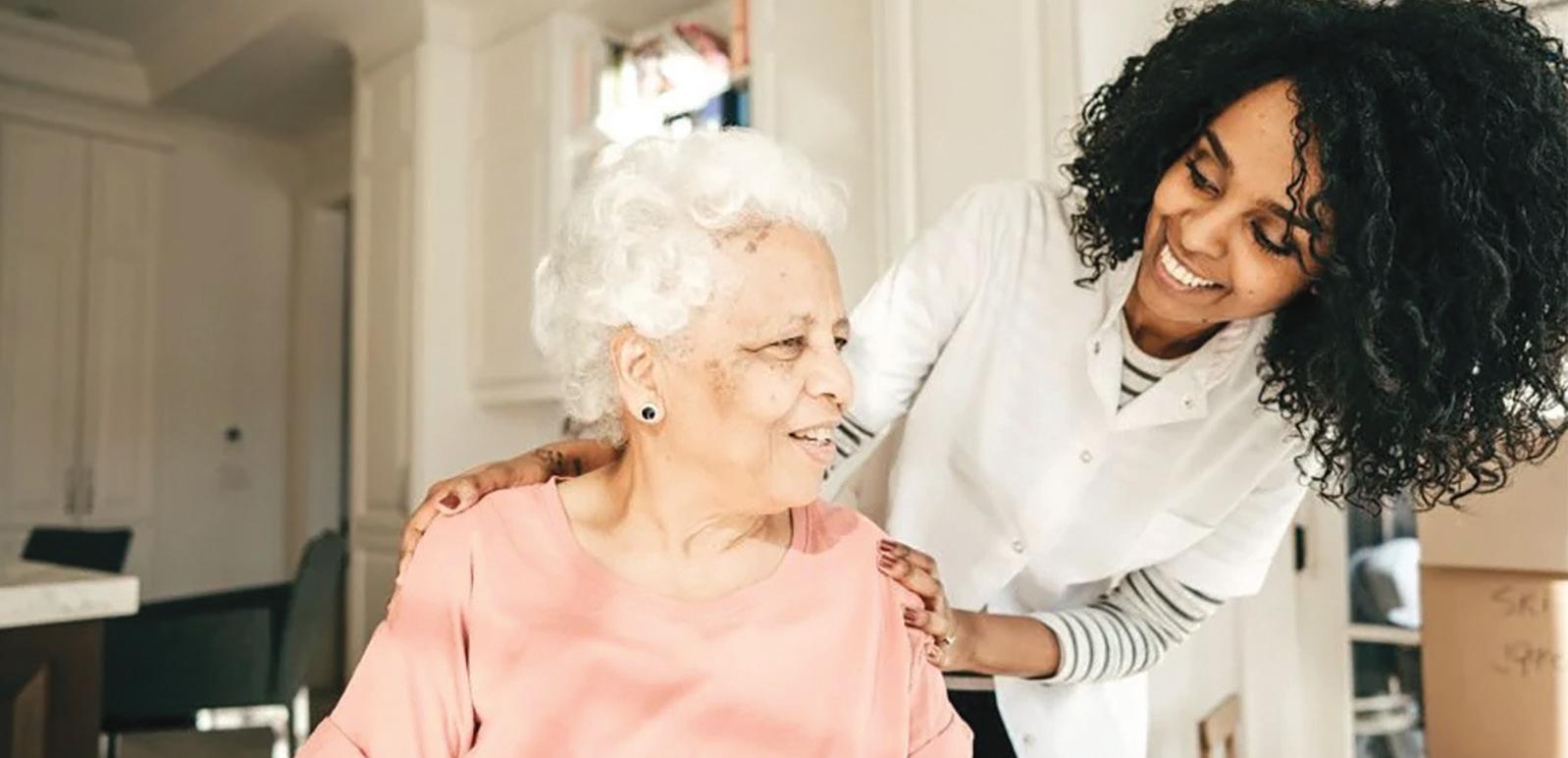
“Training is very helpful,” said Doug Moore, executive director of the United Domestic Workers of America AFSCME Local 3930, which represents roughly 150,000 caregivers in California. “But when the wages are low — and you can make more at Target or McDonald’s and get a signing bonus — then you’re going to go and do that work versus harder work, which is taking care of someone with a disability or a person that’s aging.”
The training initiative came out of Gov. Gavin Newsom’s Master Plan for Aging to improve the quality of caregiving careers. Theresa Mier, a spokesperson for the Department of Social Services, said the state hopes financial incentives will help attract new workers and keep them caring for people with specialized needs longer. In addition to their hourly pay for taking classes, in-home caregivers will receive incentive payments that start at $500 for 15 hours of training. They can earn up to $3,500 if they go on to work at least 40 hours a month with a qualified client for at least six months. Previously, counties offered some training but did not pay workers for their time.
The state issued grants, including $16 million to Homebridge, a San Francisco-based caregiving organization, to coordinate training. Classes will be offered in Spanish, Cantonese, Mandarin, and Armenian, in addition to English, to reach more workers. And state officials are planning a social media campaign to recruit new caregivers.
But the incentives are committed only through the end of 2023.
Greg Thompson, executive director of the Personal Assistance Services Council, the public authority that manages Los Angeles County’s in-home program, would like to see paid training become permanent. “There needs to be, in my opinion, some kind of accountability, structure, supervision, and ongoing training,” he said.
Many caregivers who attended early courses care for family members with a mix of physical and behavioral needs. In fact, 3 out of 4 caregivers in the in-home assistance program are relatives of clients. But the state needs to prepare for a workforce shift, one that requires people to look outside their families. The number of California seniors is expected to be nearly 8.5 million by 2030, an increase of more than 40% from 2019. Many of them will be single.
The state will need more caregivers like Luz Maria Muñoz, who has worked in the in-home assistance program for six years. The Bakersfield resident has navigated challenging situations on the job. One older client was on 30 medications. Another had bedsores, which can be lifethreatening if not properly treated. Muñoz peppered the client’s nurse with questions about dressing the wounds and felt responsible for the client’s well-being.
“Those wounds needed to be cleaned daily,” she said.
Muñoz said she’s interested in the training. The department said it sent notices about classes to all participating caregivers and will follow up with updates. Counties also helped spread the word online, in newsletters, and via posted flyers.
Early sessions have filled up as soon as they’re set up. Leslie Kerns, the in-home assistance registry manager for Connecting Point, the public authority for the program in Nevada, Plumas, and Sierra counties, said some classes were full after three hours. State officials said registration for classes next year should open soon.
Angelina Williamson cares for her mother, who is disabled, in San Diego and took a course on mobility and transferring patients. She said she learned how to use her body to break a fall and that if her mother falls, it’s better to bring her a chair than pick her up because her mother has enough upper body strength to pull herself up, with Williamson’s help.
Recent surveys suggest that caregivers are likely to be interested in self-care. In a review of nonprofit caregiver resource centers in California, 35% of caregivers reported that their health had worsened while providing care, and 20% had experienced symptoms of depression. Some caregivers also reported being lonely, which could include lacking companionship, feeling left out, or feeling isolated from others. And a 2020 report by the National Alliance for Caregiving and AARP found that 26% of caregivers had difficulty managing their stress.
Robbie Glenn, a single father in Anaheim, attended Espedal’s self-care class and learned to take time for himself. By day, Glenn cares for his 11-year-old son, Edin, who has birth defects from alcohol exposure and has nonverbal autism. Edin needs help going to the toilet and bathing. He has epilepsy and sometimes walks in his sleep. By night, Glenn freelances, doing post-production work, such as film editing and color grading.
Glenn now uses a timer to remind himself to take a break. “And,” he said, “I’ve been doing those breathing exercises a lot.”
Features
Livingstone Honors Georgette “Gigi” Dixon
Livingstone College will hold its annual December Conferral of Degrees on Friday, Dec. 9, at 10 a.m. at Varick Auditorium, located on the campus.
Georgette “Gigi” Dixon, executive vice president and head of External Engagement for Diverse Segments, Representation and Inclusion for Wells Fargo, will deliver the address to the graduating seniors. The college’s Board of Trustees also approved for Dixon to receive an honorary doctorate degree in humane letters during the program.
Dixon is no stranger to Livingstone College, but her reconnection to the historic black college has been renewed through Livingstone President Dr. Anthony J. Davis. This will be his first commencement as the new president of the college.
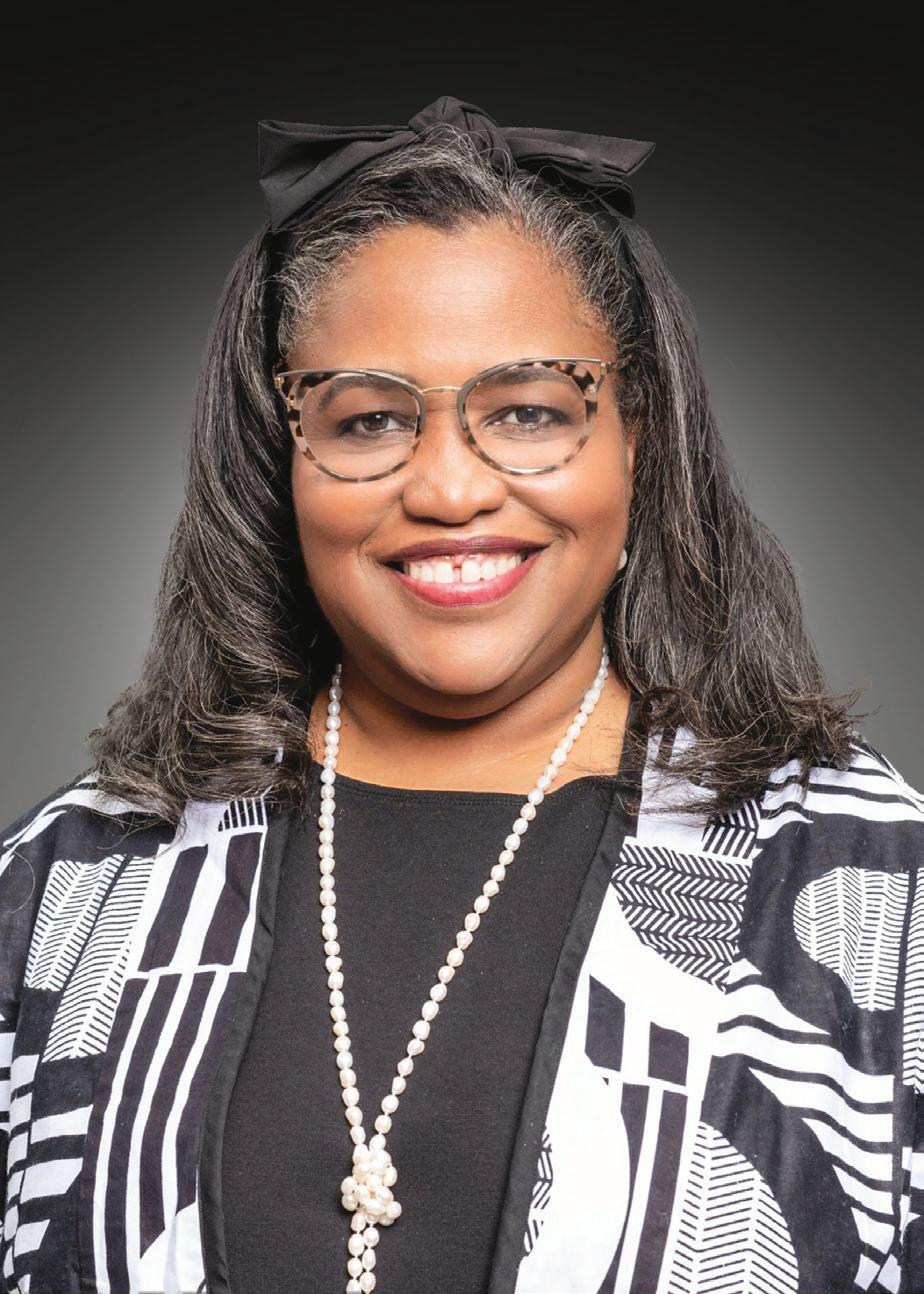
“Mrs. Dixon is a key influencer who uses her platform and insight to support communities and organizations who are executing the critical work that impacts society, Davis said. “As the 13th president, I am committed to exposing our students to individuals that will assist them in unlocking their potential and unleashing their power.”
Dixon is an HBCU graduate herself, having earned a Bachelor of Science with distinction from Tennessee State University (TSU) in speech communications and theater. She has certificates in Corporate Community Involvement and Nonprofit Leadership from the Boston College Carroll School of Management.
Her upbringing in the South during desegregation and accomplishments at Tennessee State paved a career and life work for her in diversity and inclusion. She was one of two girls to desegregate her middle school; and she became the first woman president of the student body at TSU.
In her role at Wells Fargo, Dixon is responsible for stakeholder relationships, sponsorship activation, and advocacy and influencer strategies. Her team advances diversity, equity and inclusion by leading and amplifying their efforts externally to ensure that people across their workforce, communities and supply chain feel valued and respected, and have equal access to resources, services, products and opportunities to succeed.
Throughout her 28-year career at Wells Fargo, Dixon
has served in many capacities including head of external relations for Wells Fargo Government Relations and Public Policy; marketing manager; director of emerging markets; and director of strategic partnerships. She also served on the company’s Corporate Diversity Council for six years.
In 2005, Dixon was recognized as one of the Most Powerful Women to Watch by American Banker magazine.
In addition to her career, Dixon also serves on the national board of directors for the NAACP and as vice chair for the NAACP Foundation. She is vice chairman of the U.S. Black Chambers Inc.; a corporate advisory board member of UnidosUS; and a trustee of the Trust for the National Mall.
A trained opera singer as well, Dixon is chair of the Opera Carolina Board of Advisors. She is also a member of Delta Sigma Theta Sorority Inc.
She lives with her family in Charlotte.
The graduation ceremony will be livestreamed on Livingstone College’s official YouTube channel.
By Stacy M. Brown NNPA Newswire Senior National CorrespondentThe images remain surreal. WNBA Star Brittney Gri- ner walked across a tarmac in Saudi Arabia and met faceto-face with Russian arms dealer Viktor Bout.
Having agreed to the exchange, America couldn’t have intended the face-to-face – though it proved incident free.
While serving a 25-year prison sentence in Illinois, Bout headed back to Moscow. Griner, unlawfully detained and stuck in a prison colony on a nine-year sentence since her drug conviction earlier this fall, headed to Texas.
“The fact remains that she’s lost months of her life, experienced needless trauma, and she deserves space, privacy, and time with her loved ones to recover and heal from her time being wrongfully detained,” President Joe Biden declared.
Biden noted that Griner had never pleaded for special treatment. Instead, she wanted freedom for her, and other Americans unjustly imprisoned in Russia’s harsh Soviet-era style conditions and those detained in other nations.
“She said, ‘please don’t forget about me and the other American detainees,’” Biden shared from his July correspondence with Griner.
She said, ‘please do all you can to bring us home.’”
For varying reasons, Griner’s return home last week resonated with so many.
“We are taking a collective breath because she’s home,” political expert and strategist Amani Wells-Onyioha, told the National Newspaper Publishers Association’s Let It Be Known live morning show.
“It took much longer than we anticipated, but it was a great and smart move for Biden. Hopefully, he will continue to help make the Black community happy over the next two years because we still think he has a lot to prove,” Wells-Onyioha insisted.
She believes that Biden’s work to free Griner and other efforts to secure a level playing field for African Americans can help Democrats now and in the future.
“I understand the frustration that a lot of Black vot-
ers have with the Democratic Party because we are often used as like a big pillar of that vote,” Wells-Onyioha stated, echoing words she wrote in a national column.
“A lot of Black people feel jaded because they feel like once the election is secured, and we come out in record numbers more every year, that not a lot of tangible results
are being applied to the lives of everyday Black folks in this country.”
Like Wells-Onyioha, the Biden administration believes allowing Griner adequate recovery time is crucial. However, unless there’s a resolution to other hostages like former U.S. Marine Paul Whelan, imprisoned in
Russia for nearly four years, Griner will remain a hot topic – even a source of outrage from some.

“She will be offered appropriate care and support from the U.S. government, including medical screenings,” White House Press Secretary Karine Jean-Pierre asserted.
When he learned of Griner’s release, Whelan was displeased.
“I am greatly disappointed that more had not been done to secure my release, especially as the four-year anniversary of my arrest is coming up,” Whelan, 52, told CNN from a penal colony.
“I was arrested for a crime that never occurred,” he said, perhaps a not-too-subtle shot at Griner, who admitted to illegally carrying a small amount of cannabis oil.
“I don’t understand why I’m still sitting here,” Whelan demanded.
Wells-Onyioha said the specter of Whelan still in custody is another issue facing Griner when and if she does a sit-down interview with the media.
“I understand Whelan’s concerns,” Wells-Onyioha noted.
“I think the reason they pressed to get Brittney home was that her arrest was ridiculous,” she said.
“She played basketball over there and won for their team. The arrest clearly was a slap in the face to Biden and a response to Biden backing Ukraine in the war.”
Wells-Onyioha agreed that the prisoner swap sending Bout home wasn’t an equal trade.
“Not for someone who is all about death for all Americans, for someone who just had a little [cannabis oil] on her,” Wells-Onyioha reasoned.
“But Russia needed leverage,” she said.
Jean-Pierre asserted that the Biden administration tried to include Whelan in the swap, but Russian officials said it was Griner or nobody.
“This was not a choice for us of which American to bring home,” Jean-Pierre said.
“That was not the choice. It was a choice between bringing home one American or bringing home none.”
Brittney Griner is Home But How Welcoming is America? Capitol
Lawmakers Push Bill That
By Stacy M. Brown NNPA Newswire Senior National CorrespondentOn the surface, the Journalism Competition and Preservation Act sounds like a win for news organizations that remain committed to providing vital information for their communities.
It also sounds suitable for the survival of important local news.
However, like many pieces of legislation that float around Capitol Hill, flaws abound.
Intended to support local journalism, the bill introduced by Sen. Amy Klobuchar (D-MN) would create a link tax on social media platforms.
The bill suggests lawmakers would carve out an exception in the federal antitrust law and allow U.S. publishers to negotiate payment from websites that profit from aggregating lists of links on the search and social media plat- forms where users can click on and visit a news site.
In Klobuchar and her colleagues’ attempt to save local news from tech behemoths like Google, Facebook, and Twitter, critics contend that the legislation would be the final nail in the coffin of small and minority-owned newspapers and media companies.
The National Newspaper Publishers Association (NNPA), the trade organization representing more than 230 African American-owned newspapers and media companies, count among those objecting to the measure.

For further clarity, the NNPA represents the interest of the Black Press of America, which for 195 years, has published through slavery, Jim Crow, Civil Rights, and the modern-day era of Fake News.
“The JCPA would require tech platforms to carry and pay any eligible news publisher for ‘access’ to content. While this may, again, seem well-intentioned at first look, upon deeper inspection, the law defines ‘access’ so broadly it will require payment for simply crawling a website or sharing a link,” NNPA President and CEO Dr. Benjamin F. Chavis Jr. wrote in an editorial.
“Similarly, while a number of conglomerates are scoped into the bill, true independent or small newspapers are explicitly excluded from the legislation because the bill says that an eligible publisher must earn more than $100,000 per year,” Chavis asserted.
The primary problem? “The bill itself wouldn’t address the underlying problems that have news organizations struggling economically,” Jeremy Littau of Future Tense wrote.
Littau further noted the bill’s structural problem.
“The internet is built in ways that favor free link exchange, and news organizations risk not being missed if they are booted from platforms whose business ironically is built to deliver them traffic,” he wrote.
“There’s no oversight or accountability for whatever money is paid out to know whether the JCPA actually works as intended.”
Littau continued:
“Finally, there’s the innovation problem related to who is excluded. The JCPA would subsidize dying brands and, likely to avoid weighing in on the tiresome debate over whether bloggers are journalists, creates the $100,000 threshold that leaves behind some of our most promising news startups. The future of news can’t be about propping up struggling legacy players and punishing innovators.”
Chavis also related that many African American and other BIPOC news outlets are independently owned.
Furthermore, these news outlets have developed and grown their audiences because mainstream media publications excluded the perspectives of minority voices.
“The Black Press built our own news outlets to support our own voices. As a result, this legislation would only further reinforce harmful racial exclusion trends rather than actually help smaller local publications like those in the NNPA,” Chavis insisted.
“Similarly, recent amendments to the bill requiring non-discrimination would require platforms to carry and pay for hate speech and objectionable content that could harm BIPOC communities.”
He said if passed, the JCPA would boost misinformation and extremist content. News publications from either side of the aisle that support extremist views will receive money, and tech platforms will be required to carry them on their services.
“This will make it even harder for platforms to moderate harmful and false content. We know that communities like ours will suffer most,” Chavis concluded.
Sen. Klobuchar did not respond to a request for comment from the Black Press.
Several lawmakers in both chambers, including Senate Majority Leader Chuck Schumer (D-N.Y.), Sen. Cory Booker (D-N.J.), Rep. Al Green (D-Texas), Rep. Hakeem Jeffries (D-N.Y.), Rep. Stacey Plaskett (D-V.I.), and Rep. Sheila Jackson Lee (D-Texas), also did not return messages.
“Instead of supporting local broadcasters and improving our access to the news, the JCPA favors big broadcast-
ers and threatens our ability to find factual information online,” ACLU officials said.
Officials at the nonprofit Public Knowledge argued that the legislation would do nothing to help preserve local journalism.
They further claimed that it could compound some of the biggest problems in the information landscape today, including consolidation and declining quality of information.
“While the JCPA has undergone extensive rewrites, it is still an antitrust exemption, a legal maneuver that has a history of failing to achieve beneficial goals,” said Lisa Macpherson, Senior Policy Analyst at Public Knowledge.
“Allowing the largest media conglomerates – like Alden Global Capital, Gannett, Sinclair Broadcast Group, and News Corp – to collude on the terms of access and value of their content will hurt competition and make our news landscape worse, not better.”
“In a bill that is supposedly meant to encourage local journalism, there is no accountability for how the money is spent. Facebook and Google will fund more stock buybacks and executive bonuses than journalists’ salaries. It also introduces a precedent of payment for simply linking to information on the internet.
“This bill is also a threat to content moderation. The JCPA allows publishers to sue Facebook or Google for taking down content that the platforms find offensive or contrary to their community standards.
“And with the most recent amendment, proposed by Sen. Cruz (R-Texas), harmful misinformation, networked disinformation, and hate speech will be even harder to police under this bill — and that is by design.
“The JCPA will not save local journalism. Instead, it will make a few billionaires even wealthier at the expense of a healthy and open internet and information environment for all of us.”
House Oversight Committee’s Revelations are Merely the Tip of Trump’s Iceberg of Graft To Be Equal #41:
By Marc H. Morial, President and CEO National Urban League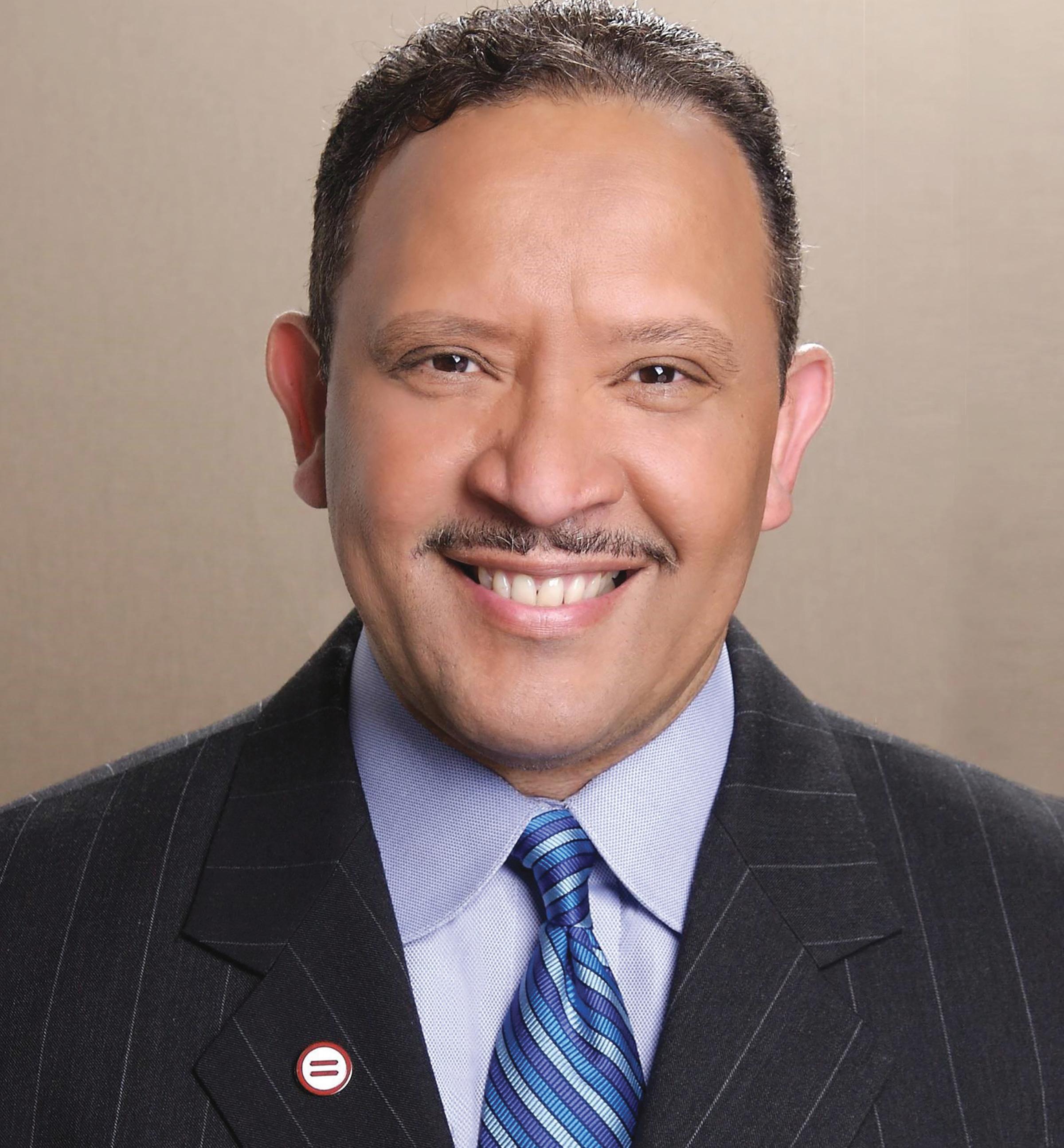

“The exorbitant rates charged to the Secret Service and agents’ frequent stays at Trump-owned properties raise significant concerns about the former President’s self-dealing and may have resulted in a taxpayerfunded windfall for former President Trump’s struggling businesses.” House Oversight Committee Chairwoman Rep. Carolyn B. Maloney.
It’s not clear whether the opportunity to funnel taxpayer funds into his private business was Donald Trump’s primary motivation for seeking the presidency. What is crystal clear, however, is that he took every opportunity to do just that – and lied about it along the way.
The House Oversight Committee revealed that the Trump Organization charged the Secret Service up to $1,185 per night for hotel rooms used by agents protecting Trump family members. That’s five times the government rate and nearly 24 times the $50-a-night rate the Trump Org claimed to be charging.
Trump visited his own properties more than 500 times during his presidency, and the Trump Organization has continued to bill the Secret Service since he left office and began living in his properties full-time.
The records released by the Oversight Committee, which cover more than $1.4 million in self-dealing, are merely the tip of Trump’s iceberg of graft. The cost to the taxpayer of tax dodges, deceit, and self-dealing by Trump’s family and companies reaches into the hundreds of millions.
A Washington Post investigation found that Trump’s company raked in at least $2.5 million in taxpayer money and $5.6 million in campaign funds during his presidency, — an incomplete accounting, as several federal agencies refused to turn over records to the Post. The Trumps’ illicit taxpayer-funded windfall included exorbitant overcharges like $2,600 per night for a house at Mar-a-Lago, $50 per palm for decorative palm trees, $7,700 for a catered dinner for 30 – more than $250 a plate — and more than $1,000 in liquor for a White House staff meeting.
Eric Trump, Executive Vice President of the Trump Organization, falsely claimed the business was required by
law to charge the federal government, and that government employees were charged only “like 50 bucks” per night for hotel rooms.
But Trump’s fleecing of the American taxpayer did not begin with his presidency. According to The New York Times:
“He and his siblings set up a sham corporation to disguise millions of dollars in gifts from their parents, records, and interviews show. Records indicate that Mr. Trump helped his father take improper tax deductions worth millions more. He also helped formulate a strategy to undervalue his parents’ real estate holdings by hundreds of millions of dollars on tax returns, sharply reducing the tax bill when those properties were transferred to him and his siblings.”
Ironically, the fortune Trump inherited – and largely squandered – was built on taxpayer-funded subsidies and loans of the very kind he sought to eliminate as president. Shortly after President Franklin D. Roosevelt created the Federal Housing Administration in 1934, Trump’s father, Fred Trump, used FHA loans to build apartment buildings. During World War II, he built more than 1,000 apartments for the Navy at taxpayer expense. After the war, he sold apartments to returning veterans, funded by the G.I. Bill. The elder Trump’s taxpayer-bolstered wealth backed the major real-estate project that launched Donald Trump’s own career.
As president, Trump proposed the largest retrenchment of federal housing aid since the U.S. Housing Act was enacted in 1937.
Trump has not been accused of breaking any laws with the brazen bilking of the taxpayers revealed this week. But presidents – even ex-presidents — should be held to a higher standard than “technically legal” and the House Oversight Committee’s work should result in safeguards to prevent future presidents from abusing the power of the office for personal gain.
Disclaimer: The views and opinions expressed in this article do not necessarily reflect the official policy or position of BlackPressUSA.com or the National Newspaper Publishers Association.
Features
Proposed Journalism Competition Preservation Act Negative Impact on Small


In September, lawmakers in Washington rushed through major legislation that would reward massive, legacy media corporations at the expense of smaller community-focused and minority-owned newspapers. While the Journalism Competition Preservation Act (JCPA) is meant to protect publications like those in the National Newspaper Publishers Association, it would ultimately threaten our ability to inform our communities, line the pockets of massive media conglomerates and hedge funds, and lead to the proliferation of harmful misinformation. Good intentions sometimes have negative and counterproductive consequences.
The goal to foster quality, local journalism and journalist jobs is well-intentioned. Local news outlets provide Americans with important information about the political, economic and cultural issues that matter to them. The news industry has reached an inflection point, and much work is still needed to secure a bright and sustainable future for minority-owned publications.
Newspaper employment has fallen by 70% in the past 15 years, and 20% of America’s counties are at risk of becoming news deserts. The top 25 media chains now own a third of all U.S. newspapers. Thousands of newspapers have been acquired by hedge funds and private equity firms like Alden Global Capital or by media behemoths like Gannett, Lee Enterprises and McClatchy. For these media companies, a local newspaper is an asset for profit – not a valuable source of local information. Big media chains acquire newspapers, lay off journalists and staff, drive down wages and shutter publications forever – as they spend millions on executive salaries and stock buybacks.
Now, these same media companies and hedge funds are a step closer to receiving huge payouts – without any accountability or transparency to direct funds to local journalism and journalists. The JCPA would require tech platforms to carry and pay any eligible news publisher for “access” to content. While this may, again, seem well intentioned at first look, upon deeper inspection the law defines “access” so broadly it will require payment for simply crawling a website or sharing a link. Similarly, while a number of conglomerates are scoped into the bill, true independent or small newspapers are explicitly excluded from the legislation because the bill says that an eligible publisher must earn more than $100,000 per year.
Many African American and other BIPOC news outlets are independently owned. Furthermore, these news outlets have developed and grown their audiences because mainstream media publications excluded the perspectives of minority voices. The Black Press built our own news outlets to support our own voices. As a result, this legislation would only further reinforce harmful racial exclusion trends, rather than actually help smaller local publications like those in the NNPA.
Chargers Stop Dolphins at SoFi
By Earl Heath Contributing Sports WriterThe Los Angeles Chargers looked like a team on a mission after taking down the Dolphins on Sunday night, 23-17.
L.A. enjoyed a solid first half that allowed them to jump out to a 10-point lead. Justin Herbert missed only five of his 29 throws through the opening two quarters and the offense had out gained Miami by nearly 200 yards.
He completed 39 of 51 for 357 yards and one TD. That give him twenty-one 300 yard games in his first three years. Something that hasn’t been done before.
‘’It was an incredible team win,’’ Staley said. ‘’Defensively we answered all the challenges in the game that we had to face. Justin made a lot of winning plays and really made good decisions throughout the game.’’
Keenan led all receivers with 12 catches for 92 yards. RB Austin Eckler ran for 45 yards on 15 carries and a touchdown
Tyreek Hill was able to get them on the board thanks to a wild fumble recovery that he returned 57 yards for a touchdown. In the second half, Hill also had a 60-yard
touchdown catch to cut the lead to three. At that point, however, Herbert and the Chargers were able to go on two field goal drives after drives of 57 and 75 yards.
Miami’s offense was a different story entirely. The disjointed rhythm between Tua Tagovailoa and his receivers he finished the day completing 10 of 28 for 155yards and a TD. Itlooke bad early on as the 3-year man completed just three passes in the first half and the offense had 55 yards of total offense.
On the defensive side it was Kenneth Murray leading the Charger with 7 tackles 6 solo, He was followed by Drue Tranquill and Ja’sir Taylor with 5 each. The Defense gave up only 293 yards that included 92 on the ground.
‘’We knew he loved to throw inside the hashes,’’ Chargers linebacker Drue Tranquill said. ‘’He was gonna try to get Tyreek and Jaylen (Waddle) in on those dagger routes, so we definitely packed the middle a little bit and forced him to try to throw it outside.’’
‘There were a lot of good things from all three phases. The defense did an incredible job,’’ Herbert said.
The Chargers are 7-6 while the Dolphins fall to 8-5. Next Up: Chargers host Titans at So Fi Sunday at 1:25pm.

Fresno State Takes on WSU in Jimmy Kimmel Bowl
 By Earl Heath
Contributing Sports Writer
By Earl Heath
Contributing Sports Writer
Washington State,
The Cougars are heading to their seventh consecutive bowl game. Jake Dickert served his first full season as the head coach after moving up from defensive coordinator to guide the team for the final six games of the 2021 season.
The Cougars averaged 27.8 points and 375.5 yards per game finished the year 7-5 with all five losses coming to the top teams in the Pac-12. Dickert’s fell to Oregon by three points and Utah by four points. One of their non-conference wins was on the road in Wisconsin. The defense was fifth in the conference in giving up 22.4 points and 394 yards per game.
Dickert’s been on a recruiting frenzy before the game. “Those are things we’re trying to navigate on the fly. I mean, as we’re down there, you know, Tuesday, Wednesday, Thursday night, I’m gonna be out on the road. I mean, it’s gonna be incredible to be flying in and out of LAX and still being in people’s homes and trying to balance both things,” said Dickert. “So, I know this, when December 22nd comes, I’m not moving from the couch.”
They are led by QB Cameron Ward completed 298 of 465 passes for 3,094 yards and 23 touchdowns. His favorite targets were receivers De’Zhaun Stribling and Robert Ferrel. Stribling caught 51 passes for 602 yards and five touchdowns and Ferrel had 46 receptions for 517 yards and four touchdowns. The Cougars ground game was led by Nakia Watson, who had 736 yards in 130 rushes and eight touchdowns.
Fresno State earned the berth to the Jimmy Kimmel LA Bowl bystopping the Boise State Broncos on their home field, 28-16. The Bulldogs avenged an earlier loss to the Broncos this season, 40-20, “We’ve come a long way since the first part of the year when a lot of people didn’t believe in us,” Tedford said. “But the staff did and the kids did. … It’s nice to see them happy.”
Tedford and the Bulldogs. are 9-4 on the year and 8-1 in conference.
Fresno State has won eight straight games after getting off to a slow start with one win in their first five games. Two of the losses were games with two of the top teams in the Pac 12 – USC and Oregon State. All four losses for Fresno State were against bowl eligible teams.
Quarterback Jake Haener, who missed part of the season with a lower leg injury he leads the ranked offense in
the conference averaging 30.9 points per game and 407 yards per game. The Danville, California native has contributed by completing 228 of 314 passes for 2,616 yards and 18 touchdowns.. Jordan Mims heads up the strong Bulldog running game with 1,163 yards in 243 tries and 16 touchdowns. Haener’s top targets have been Jalen Moreno-Copper and Nikko Remigio. Moreno-Copper has 79 catches for 1,044 yards and five scores, and Remigio has
69
“We
Williams Brings Home Heisman
By Earl Heath Contributing Sports WriterJust a few blocks from Broadway in the Big Apple Caleb Williams became the eighth Heisman Trophy winner from USC and the first since 2005 (Reggie Bush). The room was filled with some of college football greats as he accepted one of the most elite awards in college sports.

“To now be a part of this historic fraternity is truly an honor and something I will cherish for the rest of my life,” Williams said during his acceptance speech at the 88th ceremony “While this may be an individual award, I certainly understand that nothing — and absolutely nothing — in this sport, nor life, is done alone.”
Williams led the FBS in passing touchdowns (37) and ranks fourth in passing yards (4,075). He and Lincoln Riley both left Oklahoma following the 2021 season and settled at USC, helping to quickly turn the program around.
In just one season he and his teammates turn a 4-8 team into an (11-2, 8-1 PAC-12) and one game away from the CFP.
Williams took the stage dressed “sharper than a Gillette Blue Bade” wearing a Gucci grey suit. His speech had humbling theme as he shared some of the people that help get him there on this night.
He thanked coach Lincoln Riley whom he followed from Oklahoma after his freshman season and his wife Caitlan.
“Thank you for allowing me to be part of your family. And not only allowing him to coach me way more than he
should be at home.”
He thanked “Mike Bohn (USC Athletic Director) and his wife Kim for being here today. I appreciate you always for making us the best student athletes possible. My teammates and I appreciate all you have done for USC.”
The Washington D.C. native thanked his family and father (Carl).
“Thank you for always being my mom (Dayna) first. The women behind the scene who always has a smile on her face. You’re an inspiration to me in many ways. To the old man over there my dad (Carl), he always walks to the beat of his own drum. Thank you for showing mw the way. You instilled a work ethic in me at a young age that I can’t thank you enough for.”
He gave praise to his high school Gonzaga college High in DC “Thank you my brotherhood he stated,” he stated. And you Coach Randy Thrivers, you had the courage to start a ninth grader in one of the toughest high school conference in the Country. The Gonzaga experience helped both on and off the field to prepare me in more ways than you could imagine.”
Williams recognized the other finalist CJ (Stroud),Stets (Stetson Bennet) and Max(Duggan) “You guys are unbelievable competitors. And I am so happy to be up here with you all.” Now it back to work on to the Cotton Bowl to face Tulane.
The Trojans had three previous winners in attendance Matt Lienart, Carson Palmer and Mike Garrett who was the first to win the award at the school.

Brotherhood Crusade Held Its 54th Annual Gala
Honoring Those on a Mission to Improve the Quality of Life for Families
By Philtrina Farquharson Contributing WriterThis past weekend, the 54th Annual Award Brotherhood Crusade Gala took place to recognize individuals that have made significant contributions in their industry and the community by improving the quality of life for youth and families. The event was celebrated at the Beverly Hilton Hotel after a two-year hiatus due to the COVID-19 pandemic.
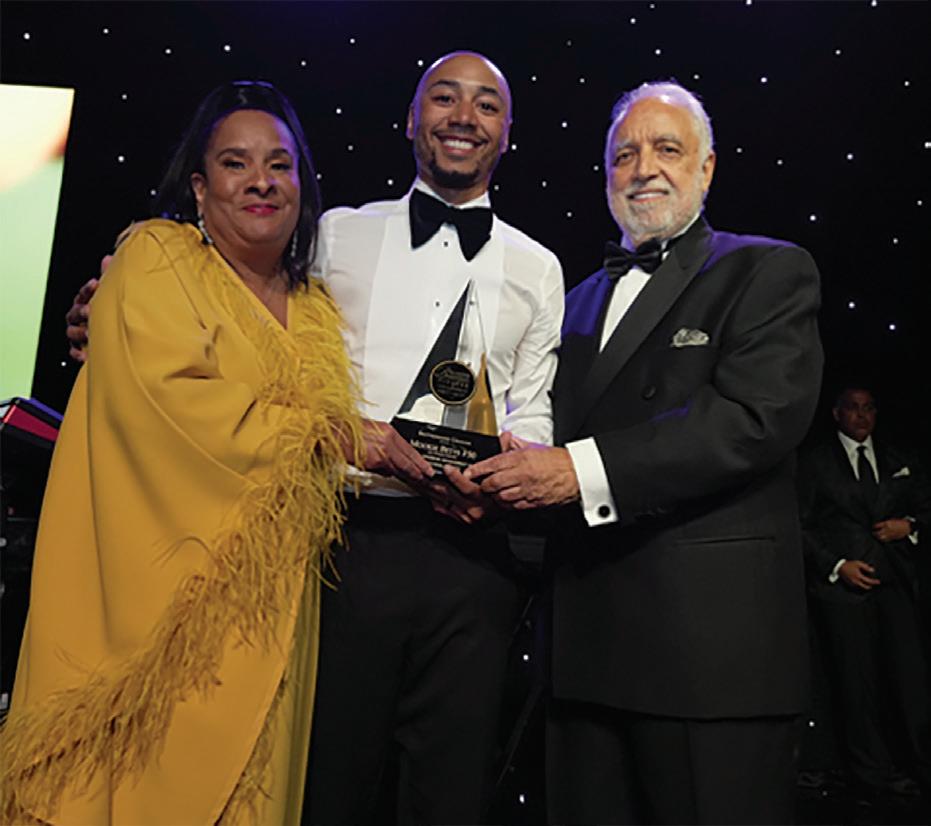
Brotherhood Crusade is a grassroots organization that started with Founder Walter Bremond’s vision of improving the quality of life for low-income, underserved, underrepresented, and disenfranchised individuals. The mission continues to be to remove Barriers that impact the road to success to promote personal, social, and economic growth and wellness in South Los Angeles.
Today, the organization offers more than 25 programs and services to at-risk youth and families. Some offerings include golf mentoring, a BioFuture STEM program, Mentor & Me, and the Junior Executive Leadership program. These services span five categories: youth development, financial literacy, business enrichment, community events, and sports.

The first honor handed out was the African American Achievement Award. This is a prestigious recognition presented to individuals who have made significant contri-
The
to assist communities facing economic hardship and food insecurity made honoring him an easy decision, explained current President and CEO of Brotherhood Crusade, Charisse Bremond-Weaver.
The gala featured entertainment by three-time GRAMMY® award-winning R&B hitmaker NE-YO and speeches from elected officials, Los Angeles Mayor Karen Bass, and Supervisor Holly J. Mitchell.
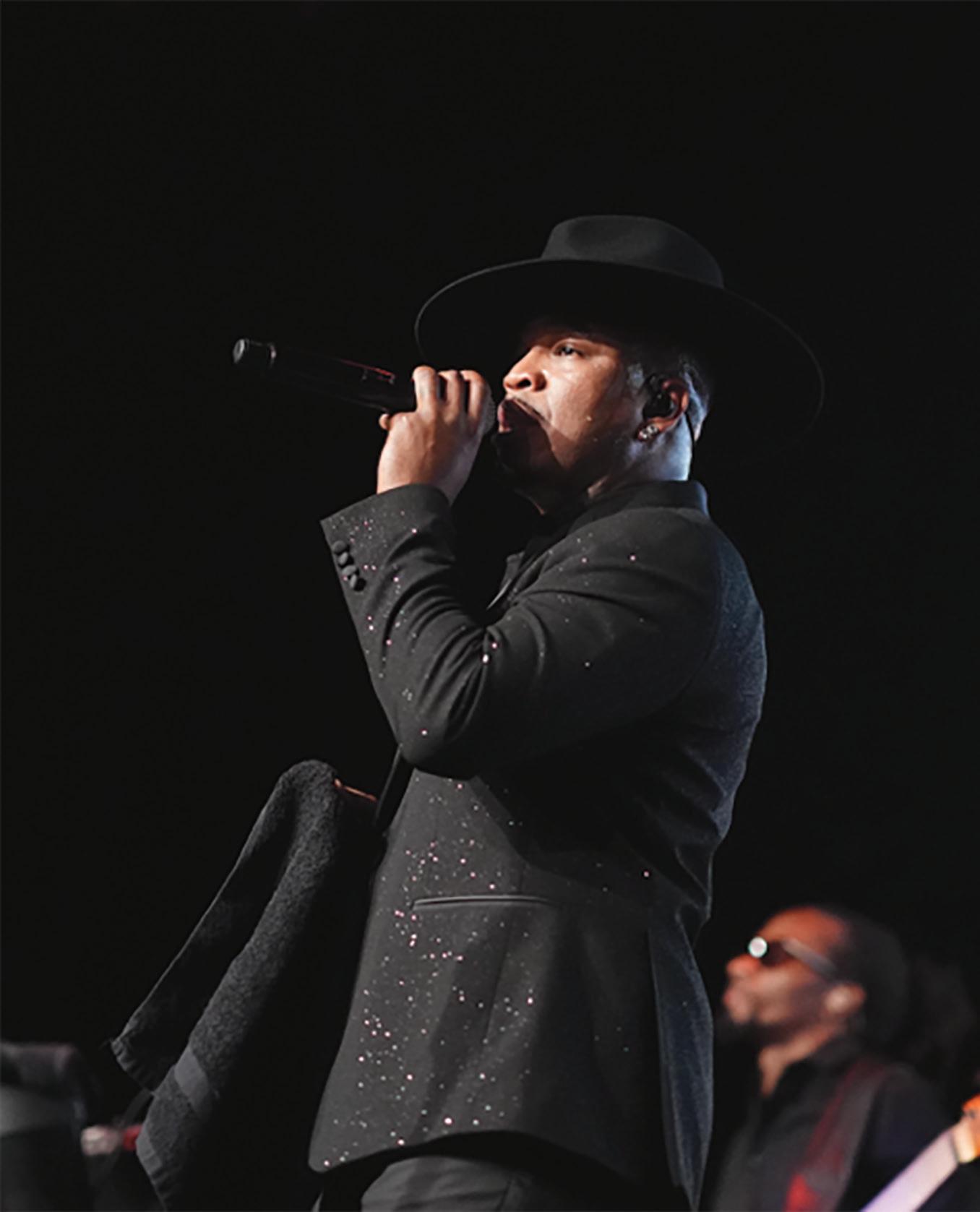

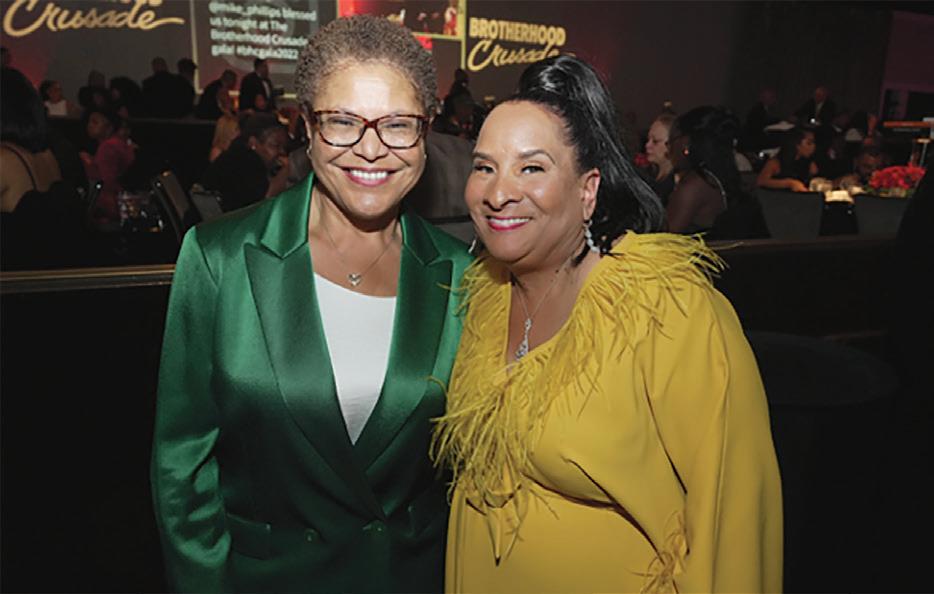

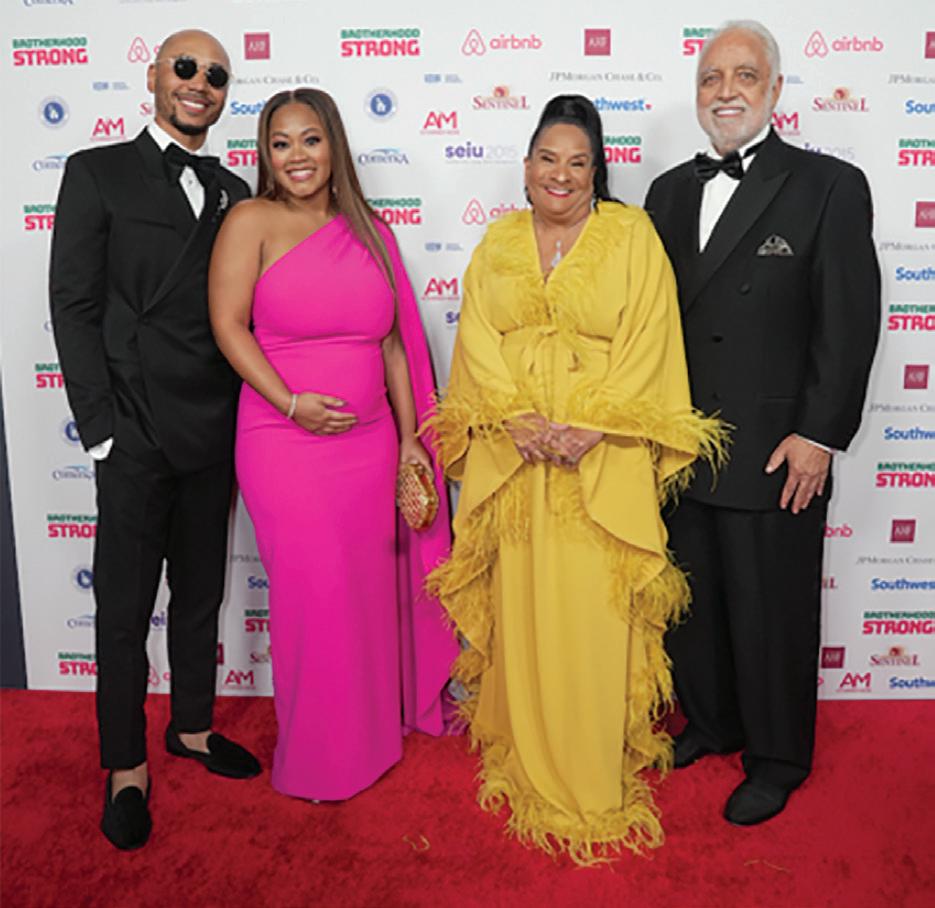
“I’m not sure where I would be without the support of the Brotherhood Crusade,” said Dante Reese, a Brotherhood Crusade program participant. “The mentoring and guidance I’ve received from the youth development programs have helped equip me with the skills and confidence I need to succeed in school and life.
Over one million dollars was raised this past weekend which will help support and grow the many programs and services that Brotherhood Crusade provides for the youth of South Los Angeles.
To learn more about Brother Crusade and to support its mission, you can visit https://www.brotherhoodcrusade. org/our-impact/.
